心Diǎn
《姓氏词典》 引 《五音篇海》 收载并注此音,未详其他。(按: 《汉语大字典》无此读音,姑兼收。)
一音xīn,为现行姓氏。
心Xīn
现行较罕见姓氏。今四川之合江,山西之运城、朔州及雁北地区有分布。汉族姓氏。《中文大字典》转引 《姓苑》亦收载,未详其源。
心xīn
❶心臟。張衡《東京賦》:“茍有胸而無心,不能節之以禮。”
❷指思維器官。張衡《東京賦》:“將使心不亂其所在,目不見其可欲。”禰衡《鸚鵡賦》:“心懷歸而弗果,徒怨毒於一隅。”
❸物體的中央,中心。公孫乘《月賦》:“猗嗟明月,當心而出。”當心而出,猶言出現在天空的正中。
❹泛指思想、意念、感情。枚乘《七發》:“列坐縱酒,蕩樂娛心。”司馬相如《長門賦》:“心慊移而不省故兮,交得意而相親。”
❺胸,胸中。司馬相如《長門賦》:“心憑噫而不舒兮,邪意壯而攻中。”漢武帝《李夫人賦》:“思若流波,怛兮在心。”
❻星名,二十八宿之一。劉琬《神龍賦》:“惟天神上帝之馬,含胎春夏,房心所作。”
心
一谓心脏,人体器官的主宰。《素向》云: “心者,生之本,神之变也。”“心者,君主之官也,神明出焉。”旧时则称心为思维的器官,如《孟子》:“心之官则思。”二谓思想、意念和感情。《易·系辞上》云:“二人同心,其利断金。”《诗经·巧言》:“他人有心,予忖度之。”另外,“心”还有中央之意,还是星宿名之
(旭)
心
心容纳怜悯、喜悦、苦痛,
心容量无边,疆域无垠,
它波涛滚滚,起伏翻腾,
比大海更好激动,
难得片刻宁静。
心像海洋上的灯塔
闪耀着光芒,
光芒是连接人海的桥梁。
它感受世人的痛苦,
沸腾着不停息的涌浪……
尽管世上有不少苦难,
那也让我们——
我们的心去感受苦痛!
心一旦感觉不出暴风雨来临,
就不会再有炽烈的激情。
(王守仁 译)
诗篇写出了心的博大、宽广,洋溢着诗人火一样的激情。读《心》,仿佛使人看见人心在起伏、跳动:它容纳着“怜悯、喜悦、苦痛”,人生的酸、甜、苦、辣,它都要品尝。它像波涛滚滚的大海一样,疆域无垠,深邃无底;它喜好激动,难得有片刻的宁静。富有生命激情的人的心,难道不正是这样吗?
心,本来就比世界还大,世界很小很小,心域很大很大,但什么才是心域大于世界的标志呢?诗中重点突出了心能感受人世和世人的痛苦,全诗暗暗地渗透着一个“爱”字,这爱表达了作者真、善、美的情怀。人世间的确有不少苦难,肉体的,精神的。与其说爱的目的是为了欢乐,毋宁说它根源于痛苦。即使人们摆脱了饥寒交迫的煎熬,却又会时常陷入精神生活的苦闷之中。为此,作者呼吁:让我们的心去感受世人的痛苦,让我们的心跳随时随地同人民合拍,关心人民的疾苦,对精神生活中的缺陷保持敏感和激动。因为, “心一旦感觉不出暴风雨来临,/就不会再有炽烈的激情。”
《心》除了充溢着博大精深的爱的激情以外,还有一个特点就是联想丰富,比喻贴切。作者把心比喻成海洋上的灯塔,它闪耀着的光芒是“连接人海的桥梁”,这使人想起高尔基的《鹰之歌》,作品歌颂的是以自己燃烧着的心为人们照亮前进道路的丹柯。而《心》通过传神的比喻,歌颂的也是炽烈的爱心,后者虽不如《鹰之歌》境界高远,却同样伟大崇高。
(董小玉)
心xīn
❶心中。古人认为的思想器官。《孟子·告子上》:“心之官则思。”《卫风·伯兮》四章:“愿言思伯,使我心痗。”愿,思念貌。言,语助词,无实义。伯,女子对丈夫的称谓。毛《传》: “痗,病也。”《陈风·防有鹊巢》一章: “谁侜予美,心焉忉忉。”毛《传》:“侜,张诳也。” 《说文》: “忉,忧也。”郑《笺》:“谁,谗人也。女众谗人,谁侜张诳欺我所美之人乎?使我心忉忉然。”《小雅·隰桑》四章:“心乎爱矣,遐不谓矣。”遐不,胡不,何不。谓,述说。
❷思想,心意,心思。《曹风·鸤鸠》一章:“其仪一兮,心如结兮。”毛《传》:“鸤鸠之养其子,朝从上下,莫从下上,平均如一,言执义一则用心固。”王先谦《集疏》:“七子虽多,用心均平,则有安而无殆。”《小雅·菀柳》三章:“彼人之心,于何其臻?”郑《笺》:“臻,皆至也。彼人,斥幽王也。幽王之心,于何所至乎?”
❸尖刺。《邶风·凯风》一章:“凯风自南,吹彼棘心。”马瑞辰《通释》:“盖枣棘初生,皆先见尖刺,尖刺即心。”
心
读音x·in(-),为in韵目,属en-in-un-ün韵部。息林切,平,侵韵。
❶心脏。
❷心思;意念。《荀子》:“无贪利之心。”
❸中心;中央。
❹二十八宿之一。
心
〔xin〕ghob mongx.
心肠〔xin chang〕qib shanb.
心毒〔xin du〕hent qib;jad qib; gint qib.
心烦〔xin fan〕jid ncodghob qib;caob send.
心寒〔xin han〕zanl shanb;hanx send.
心怀不善〔xin huai bu shan〕qaob qib jad xed.心慌〔xin huang〕sendhuangd.
心慌意乱〔xin huang yi luan〕nib jid janx jongt jid nis.
心急〔xin ji〕gil.
心惊胆战〔xin jing dan zhan〕benl das benl senb.
心口〔xin kou〕ghob zhallanx.
心里〔xin·li〕nhangs qib.
心软〔xin ruan〕nes shanb.
心疼〔xin teng〕khub: 他很~孩子。wud khub deb toubjul.
心跳〔xin tiao〕bul zhul ghadmongx.
心细〔xinxi〕xibsend.
心性〔xinxing〕hadloul.
心虚〔xinxu〕zhuxghad.
心硬〔xinying〕deadshanb.
心脏〔xinzang〕ghobmongx.
心窄〔xinzhai〕ngadqib.
心直〔xinzhi〕danxqibdanxxed.
心中〔xinzhang〕nhangsqib。
心《广韵》息林·侵;sīm‖xīn
 〗。
〗。 〗。
〗。 〗。
〗。 〗。
〗。 〗。
〗。 〗。
〗。 〗。
〗。 〗。
〗。 〗。
〗。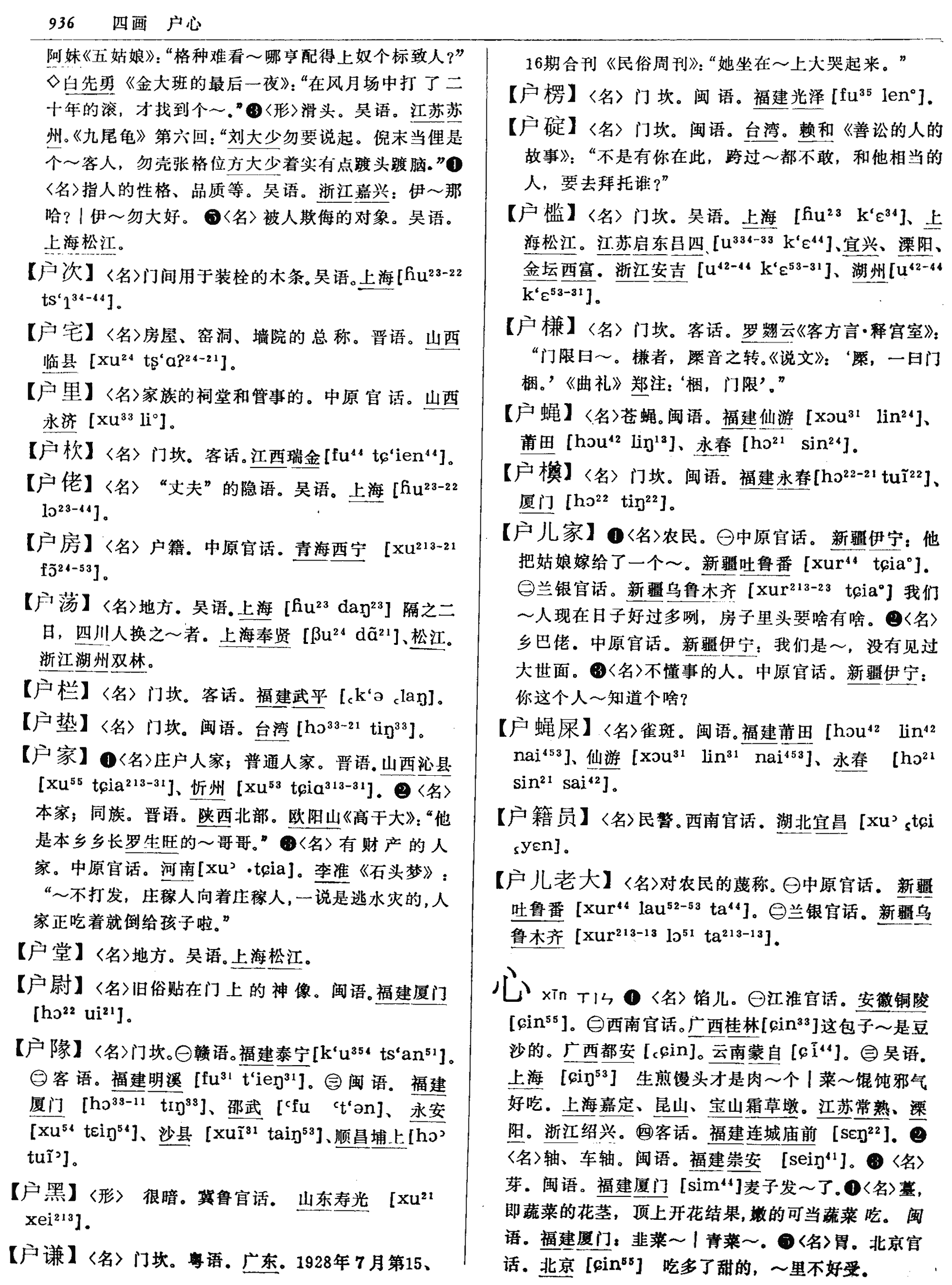
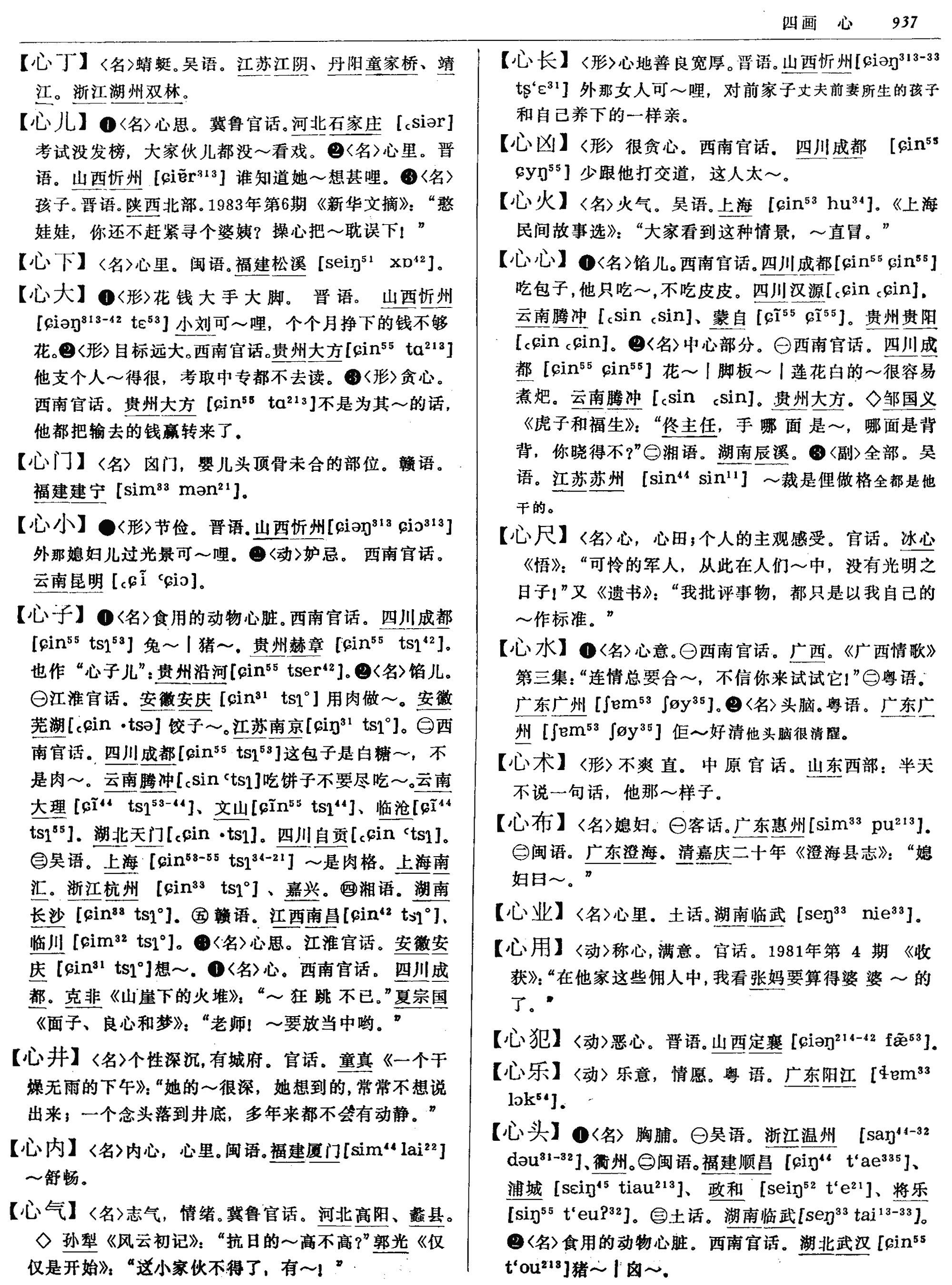
心
❶〈隐〉明清江湖诸行指数目七。见《新刻江湖切要·数目类》。参见“刘、月、汪、则、中、人、心、张、爱、足”。
❷〈隐〉清末以来布业指数目四。参“主、丁、丈、心、禾、竹、见、金、页、马”。
❸〈隐〉旧时湖北帮会指数目八。参“文、水、清、且、浅、行、人、心、志、远”。
心xīn
❶△~跳。
❷指大脑
△ 用~|~灵手巧。
❸思想;感情
△ ~情|语重~长。
❹事物的中央或内部
△ 圆~|湖~。
❺指心地
△ ~声∣变~。
❻姓。
心xīn
心
❶心脏,人和高等动物体内推动血液循环的器官:~房︱~室︱~包︱~肌︱~尖︱~窝︱~跳︱~悸(ji)︱~胆︱~腹︱腹~︱鸡~︱~腹之患︱推~置腹︱提~吊胆︱呕(ou)~沥血(xue)︱椎(chui)~泣血(xue)。
❷习惯上把思想的器官——大脑和思想、感情等都叫做心:~肝︱~胆︱~肠︱~头︱~尖︱~曲︱~扉(fei)︱~坎︱~中︱~底︱~地︱~胸︱~怀︱~髓︱~弦︱~灵︱~神︱~魄(po)︱~血︱~力︱~劲(jin)︱~情︱~绪︱~意︱~思︱~愿︱~志︱~声︱~境︱~迹︱~潮︱~机︱~术︱~得︱~裁︱~目︱~算︱~领︱~照︱~传(chuan)︱~爱︱~事︱~病︱~硬︱~软︱~疼︱~寒︱~酸︱~醉︱~服︱~折︱~仪︱~细︱~秀︱~慌︱~虚︱~浮︱~急︱~焦︱~烦︱~切(qie)︱~窄︱~宽︱~静︱~毒︱丹~︱红~︱赤~︱忠~︱诚~︱童~︱良~︱好~︱仁~︱慧~︱实~︱真~︱壮~︱雄~︱热~︱善~︱虔(qian)~︱人~︱寸~︱内~︱衷~︱本~︱愿~︱决~︱机~︱匠~︱春~︱凡~︱同~︱齐~︱贴~︱知~︱会~︱倾~︱痴~︱醉~︱民~︱军~︱顺~︱遂~︱随~︱可~︱舒~︱称(chen)~︱欢~︱安~︱甘~︱散~︱宽~︱塌~︱耐~︱信~︱攻~︱归~︱用~︱专~︱精~︱细~︱小~︱费~︱操~︱经~︱潜~︱悉~︱殚(dan)~︱一~︱恒~︱尽~︱公~︱私~︱有~︱无~︱动~︱收~︱交~︱多~︱疑~︱戒~︱忧~︱揪~︱担~︱挂~︱伤~︱痛~︱寒~︱屈~︱违~︱忍~︱横~︱外~︱变~︱偏~︱负~︱离~︱二~︱亏~︱野~︱贼~︱邪~︱兽~︱狠~︱黑~︱祸~︱~安理得︱~不在焉︱~潮澎湃︱~驰神往︱~烦意乱︱~服口服︱~甘情愿︱~广体胖(pan)︱~狠手辣︱~花怒放︱~怀叵(po)测︱~慌意乱︱~灰意懒︱~急火燎(liao)︱~如刀割︱~虚胆怯(qie)︱~惊胆战︱~惊肉跳︱~胆俱裂︱~口如一︱~旷(kuang)神怡(yi)︱~劳日拙︱~灵手巧︱~满意足︱~明眼亮︱~力交瘁(cui)︱~乱如麻︱~神不定︱~术不正︱~平气和︱~血来潮︱~有余悸(ji)︱~余力绌(chu)~猿意马︱~悦诚服︱~无二用丨~照不宣︱~直口快︱~~相印︱~领神会︱~慈手软︱雄~壮志︱痴~妄想︱处(chu)~积虑︱从~所欲︱称(chen)~如意︱诚~诚意︱同~协力︱狼~狗肺︱洗~革面︱违~之论︱粗~大意︱小~翼翼︱伤~惨目︱赏~悦目︱实~实意︱死~塌地丨随~所欲︱遂(sui)~如意︱人~不古︱师~自用︱归~似箭︱回~转(zhan)意︱一~一意︱人~惶惶︱得~应(ying)手︱小~谨慎︱问~无愧︱没~没肺︱灰~丧气︱人~如面︱人~惟危︱三~二意︱丧~病狂︱苦~经营︱平~静气︱平~而论︱齐~协力︱全~全意︱野~勃勃︱一~一德︱用~良苦︱忧~忡(chong)忡︱忧~如焚︱贼~不死︱真~诚意︱忠~耿耿︱诛~之论︱专~致志︱锦~绣口︱尽~竭力︱惊~动魄︱居~叵(po)测︱苦~孤诣(yi)︱冷~冷面︱离~离德︱扪(men)~自问︱好~好意︱驰~旁骛(wu) ︱独出~裁︱铁石~肠︱枉费~机︱费尽~机︱挖空~思︱动人~弦︱做贼~虚︱胆大~细︱言为~声︱口是~非︱扣人~弦︱沁(qin)人~脾︱胆战~惊︱耳软~活︱口甜~苦︱鬼迷~窍︱语重~长︱福至~灵︱见猎~喜︱刻骨铭~︱利欲熏~︱别有用~︱别具匠~︱恻(ce)隐之~︱有口无~︱赤胆忠~︱赤子之~︱包藏祸~︱触目惊~︱震撼人~︱无所用~︱大快人~︱振奋人~︱苦口婆~︱力不从~︱笼(long)络人~︱漠不关~︱镂(lou)骨铭~︱戮(lu)力同~︱漫不经~︱人面兽~︱煞(sha)费苦~︱世道人~︱一见倾~︱掉以轻~︱低首下~︱独具匠~︱蛊(gu)惑人~︱人同此~,心同此理︱眉头一皱,计上~来︱司马昭之~,路人皆知。
❸中心;中央的部分:圆~︱重~︱眉~︱掌~︱手~︱灯~丨轴~︱核~︱江~︱空~︱实~︱垓(gai)~。
❹星宿名,二十八宿之一。
心xīn
❶ 心脏,人和高等动物的血液循环器官:心跳︱心口。
❷ 通常指思想的器官,大脑:用心︱心口如一。
❸ 思想感情:心意︱负心。
❹ 计谋,图谋:心计︱心机。
❺ 中心:手心︱湖心。
❻ 星名,二十八宿之一。
❼ 姓。
心
❶五脏之一。位居胸中。心在脏腑中居于首要地位,为十二官之主宰,主神明和血脉。
❷武术用语。指心思、心意。古人以为心是思维器官,故把思想的器官和思想情况、感情等都说做心。《孟子·告子上》:“心之官则思”。王宗岳《十三势行二心解》:“以心行气,务令沉着,乃能收敛入骨”。
心
电脑的中央处理器(CPU)。
心
(54次)
❶心脏。~踊跃其若汤《章·悲》 吞人以益其~些《魂》
❷内心;心志。古人以为心是思维器官,故把思想的器官和思想感情等都说成“心”。非余~之所急 亦余~之所善兮 终不察夫民~岂余~之可惩 ~犹豫而狐疑兮~犹豫而狐疑 何离~之可同兮《离》~不同兮媒劳《歌·君》 ~低佪兮顾怀《歌·东》 ~飞扬兮浩荡《歌·河》首身离兮~不惩《歌·国》 ~郁邑余侘傺兮 ~郁结而纡轸《章·诵》 苟余~之端直兮 吾不能变~以从俗兮《章·涉》 ~婵媛而伤怀兮《章·哀》 ~絓结而不觧兮《章·哀》《章·悲》 ~不怡之长久兮《章·哀》 ~郁郁之忧思兮伤余~之懮懮 ~震悼而不敢 ~怛伤之憺憺人之~不与吾~同《章·抽》(2次) 抑~而自强 定~广志 人~不可谓兮《章·怀》 羌冯~犹未化《章·思》 ~纯厖而不泄兮《章·日》~冤结而内伤 不忍此~之常愁 ~𩉜羁而不开兮 ~调度而弗去兮《章·悲》 ~愁凄而增悲 仆夫怀余~悲兮《远》 有美一人兮~不绎 ~烦憺兮忘食事 君之~兮与余异 不得见兮~伤悲 ~怦怦兮谅直《辩·二》 ~怵惕而震荡兮《辩·三》 ~闵怜之惨凄兮《辩·四》 ~尚幸其弗济 非余~之所乐《辩·六》 ~缭悷而有哀 ~摇悦而日幸兮《辩·七》 ~焉取此怵惕《辩·九》 ~郁郁而无告兮 ~纡轸而增伤~煩冤之𢥞𢥞《哀》 ~淹留兮恫慌忽《士》
心xīn
❶心脏,人和高等动物体内主管血液循环的器官。《招魂》:“吞人以益其心兮。”
❷ 泛指思想情志等一切心理活动或状态。《离骚》:“心犹豫而狐疑兮。”《悲回风》:“心踊跃其若汤。”
心xīn
胃。如:吃多了甜的,~里不好受。参见〔欺心〕。
心xin
心爱 心包 心病 心博 心材1 心裁2 心肠 心潮 心传(chuan) 心胆 心得 心底 心地 心动 心毒 心耳 心烦 心房心扉 心服 心浮3 心腹 心甘 心肝 心寒 心黑 心狠 心话心怀 心慌 心活 心火 心肌 心急 心计 心悸 心迹 心尖心间 心焦 心劲(jin) 心经 心静 心境 心坎 心口 心宽 心里心理 心力 心灵 心领 心路 心率 心律 心目 心魄 心气 心窍 心切 心情 心球 心曲 心软 心神 心声 心盛4 心事 心室 心术 心数 心思 心死 心酸 心算 心髓 心态 心疼 心田心跳 心头 心土 心疗5 心窝儿 心细 心弦 心想 心性 心胸心秀 心宿(xiu) 心虚 心绪 心血 心眼儿 心痒 心药 心仪6心意 心音 心硬 心育7 心愿 心脏 心斋 心窄 心照 心志心智 心中 心重 心轴 心子 心醉 安心 熬心 版心 背心 本心 笔心 变心 操心 称心 成心 诚心 痴心 赤心 春心 粗心醋心 存心 寸心 丹心 担心 当心 灯心 点心 动心 多心 恶心 二心 贰心 放心 费心 分心 负心 腹心 垓(gai)心8 甘心公心 攻心 挂心 关心 归心 过心 寒心 好心 核心 黑心 狠心 恒心 横心 红心 欢心 灰心 会心 慧心 祸心 机心 鸡心夹心 匠心 交心 焦心 脚心 戒心 尽心 经心 精心 揪心 居心 决心 军心 开心 可心 空(kong)心 苦心 宽心 亏心 离心良心 留心 满心 眉心 昧心 扪心 民心 铭心 耐心 内心 念心儿 呕心 偏心 齐心 潜心 倾心 球心 屈心 热心 人心 忍心 散心 善心 砂心 伤心 上心 烧心 身心 省心 实心 收心手心 舒心 顺心 私心 死心 随心 遂心 塌心 贪心 谈心 溏心 贴心 铁心 同心 童心 痛心 外心 违心 唯心 窝心 无心悉心 细心 闲心 小心 歇心 邪心 信心 型心 雄心 虚心 岩心 焰心 野心 页心 一心 疑心 用心 忧心 有心 圆心 愿心在心 糟心 贼心 掌心 真心 枕心 知心 中心 忠心 衷心 重心 轴心 专心 壮心 醉心 心电图 心纹痛 心理学 心理战 心灵美 心灵学 心上人 心头肉 放心肉 得人心 赔小心 寻开心一条心 心安理得 心不在焉 心潮澎湃 心驰神往 心慈好善 心慈面软 心慈手软 心胆俱裂 心地清白 心地狭窄 心烦技痒 心烦意乱 心非木石 心浮气躁 心腹爪牙 心腹之患 心腹之言 心甘情愿心高气傲 心挂两头 心狠手辣 心花怒放 心怀鬼胎 心怀叵测 心慌意乱 心灰意懒 心回意转 心急火燎 心急如焚 心坚石穿 心惊胆战 心惊肉跳 心口如一 心口相应 心宽体胖 心旷神怡 心劳日拙9 心里有鬼 心理救护 心理疗法 心理美学 心理钱包10 心力交瘁 心力衰竭 心灵世界 心灵手巧 心领神会 心乱如麻 心满意足 心明眼亮 心慕手追 心平气和 心去难留 心如刀割 心如火焚心如死灰 心如铁石 心如悬旌 心身疾病 心神不定 心神恍惚 心神专注 心肾不交 心事重重 心手相应 心术不正 心无二用 心无牵挂 心无主见 心向往之 心心念念 心心相印 心胸开阔 心绪不宁 心血来潮 心仪已久 心有余悸 心余力绌11 心猿意马 心悦诚服 心脏死亡 心照不宣 心折首肯 心知其意 心直口快 心志不移心中无数 心中有数 心拙口笨 匠心独运 尽心竭力 全心全意 人心惶惶 人心叵测 人心向背 三心二意 撕心裂胆 童心未泯 忧心忡忡 木石心肠 煞费心机 铁石心肠 言为心声 语重心长 别具匠心 别有用心 赤胆忠心 触目惊心 大快人心 掉以轻心 动魄惊心独具匠心 刻骨铭心 苦口婆心 狼子野心 力不从心 利欲熏心 镂骨铭心 戮力同心 漫不经心 漠不关心 人贵知心 人面兽心 煞费苦心 十指连心 万众一心 无所用心 一寸丹心 一见倾心 有口无心 心脏起搏器 心之官则思 人心隔肚皮 心病还须心药治 心有灵犀一点通12 心有余而力不足 人心不足蛇吞象 不到黄河心不死 心所谓危,不敢不告 二人同心,其力断金 司马昭之心,路人皆知 以小人之心度君子之腹 为人不做亏心事,夜半敲门心不惊
心xin
❶人和高等动物体内推动血液循环的器官;心脏:他的~咚咚直跳|经过抢救,病人的~又跳动起来了|大夫说他~跳过快。
❷指思想的器官和思想、感情等:遇事得用自己的~去想一想|你说这话太伤他的~了|他和群众~连着~|一席话说得大家~里暖乎乎的。[心里话]内心的真实想法:把你的~说出来吧|大家都信赖他,愿意跟他讲~。
心
电脑的CPU(中央处理器)。
心xīn
❶人和高等动物体内推动血液循环的器官:不相干,这是急火攻~,血不归经。(十三·272)
❷指思想器官:宝玉听说,立于亭上,四顾一望便机上~来。(十七—十八·353)
❸心思;心意:弟兄们日日一处,要存这个~,到生分了。(三十·692)戒指儿能值多少,可见你的~真。(三三·734)
❹果实等中心的部分,这里指核儿:引用建莲子七粒,去~红枣二枚。(十·231)
心xīn
指牵念:宝玉看见无事,才把~放下了一半。(八一·1051)今你依旧的模样儿,我的~放了好些。(九五·1226)
亦稱“心田”、“寸田”、“心君”。五臟之一,爲五臟中之最重要之臟器。其功能爲主血脈,司神明等。其稱始見於先秦典籍,今沿稱。《素問·靈蘭祕典論》:“心者,君主之官,神明出焉。”張介賓注:“心爲一身之君主,禀虚靈而含造化,俱一理以應萬幾,藏府百骸,惟所是命,聰明智慧,莫不由之,故曰神明出焉。”南朝·梁簡文帝《上大法頌表》:“澤雨無偏,心田受潤。”宋·蘇軾《和飲酒》詩:“寸田無荆棘,佳處正在兹。”陸游《夏日雜詠》詩:“省事心君静,忘情眼界平。”參閲《靈樞經·本神》。
即心宿。
即樸𣙙。
心xīn
❶一作“辛申”。明清江湖社会谓数目七。《新刻江湖切要·数目类》:“七为心; 又: 辛申。”又 《通俗编·识余·江湖杂流》:“七: 心。”
❷清代四川成都布匹棉花线子行谓数目三。参“则、乃、心、梳、抹、高、抄、孬、丘”条。
❸清代四川成都青果小菜及零碎买卖行谓数目三。参“启、拖、心、叉、潘、梭、才、耍、卧”条。
❹旧时布匹业谓数目四。参“主、丁、丈、心、禾、竹、见、金、页、马”条。
❺旧时北京和天津的瑞蚨祥号绸布洋货店常用货价暗码,谓数目一。参“心、田、辅、百、世、义、理、助、千、秋”条。
❻旧时北京古书店通学斋货价暗码,谓数目十。参“诵、诗、闻、国、政、讲、易、见、天、心”条。
❼旧时北京古书店镜古堂货价暗码,谓数目四。参“月、到、天、心、处、风、来、水、面、时”条。
❽旧时广东地区江湖土匪谓遭勒索者。
边;心、央
○边biān
(~儿)(名)边缘:海~| 田~|马路~|~远地区|无~无际|不着~际|漫无~际|苦海无~|法力无~。
●心xīn
(名)中心;中央的部分:湖~亭|街~花园|核~|重~|文化中~|船到江~补漏迟。
●央yāng
(名)中心:宛在水中~|站在院当~|中~集权。
身;心
○身shēn
(名)身体:转过~去|~高五尺|~在曹营心在汉|~安茅屋稳,心定草根香|翻了一个~|挺起~来|全~疼痛。
●心xīn
(名)精神、思想、感情;~非铁石|~存侥幸|~专石穿|身宽不如~宽|身静养指甲,~静养头发|于~不安|身~健康。
心←→身xīn ← → shēn
心:思想的器官和思想、感情。
身:身体。
【例】 余方心动欲还。(宋· 苏轼: 《石钟山记》) 遍身罗绮者,不是养蚕人! (宋·张俞:《蚕妇》)
心xīn
〖名词〗
一、中心,核心,中央(1)。《秋声赋》:常以肃杀而为心。——常常把严厉杀伐作为它的核心。
二、指战国时楚怀王的孙子熊心(1)。《范增论》:项氏之兴也,以立楚怀王孙心。——项家的发迹,是因为拥立了楚怀王的孙子熊心。
三、脑的代称。即思维器官。古人误以为心是思想器官,遂相沿以心为脑的代称(6)。《敬姜论劳逸》:君子劳心,小人劳力。——君子从事脑力劳动,小人从事体力劳动。《圬者王承福传》:用力者使于人,用心者使人,亦其宜也。——劳力的人被人役使,劳心的人役使别人,这也是应该的。《圬者王承福传》:不肯一动其心以蓄其妻子,其肯劳其心以为人乎哉? ——不肯动脑子来养活妻子儿女,难道肯动脑筋来为他人吗?
四、心脏。人和动物体内的血液循环器官(2)。《邹阳狱中上梁王书》:臣闻比干剖心,子胥鸱夷,臣始不信,乃今知之。——我听说比干被剖心,伍子胥被装入皮口袋扔进江中,我开始不相信,现在才知道是真的。《李陵答苏武书》:陵不难刺心以自明,刎颈以见志。——我不难剖心来表白自己,刎颈来显示心迹。
五、指“胸”(1)。《李陵答苏武书》:此陵所以仰天椎心而泣血也。——这就是我李陵仰天捶胸泣血的原因啊。
六、感情,心思,想法,内心等(142)。《晋献公杀世子申生》:君安骊姬,是我伤公之心也。——国君喜欢骊姬,这样作,我就伤了国君的心。《贾谊治安策一》:下无倍畔之心。——下面没有背叛的想法。《圬者王承福传》:又诚有功,取其直,虽劳无愧,吾心安焉。——确实作出成绩,拿到报酬,虽然劳累,但问心无愧,我的内心是安稳的。
七,指贰心,异心(2)。《郑伯克段于鄢》:若弗与,则请除之,无生民心。——如果不给,那就请除掉他,不要使百姓生异心。《季梁谏追楚师》:今民各有心,而鬼神乏主。——现在百姓各怀二心,鬼神没有主人。
八、中国古代哲学术语,指人的意识(20)。《尊经阁记》:其主于身谓之心。——主宰人身时就叫做心。《尊经阁记》:心也,性也,命也,一也。——心、性、命是同一的东西。《尊经阁记》:皆所谓心也,性也,命也。——都是上面所说的心、性、命。
心xīn
❶ 心脏。《韩非子·难四》:“纣求比干之~,而天下离。”方苞《狱中杂记》:“顺我,即先刺~;否则,四肢解尽,~犹不死。”也指心所在的位置,心口。《吕氏春秋·观世》:“使者去,子列子入,其妻望而拊~曰……”
❷ 古人把心当成思想的器官,所以用为思想、心思、心情等的通称。《孟子·告子上》:“~之官则思。”《列子·汤问》:“汝~之固,固不可彻。”《寡人之于国也》:“寡人之于国也,尽~焉耳矣。”《促织》:“喜置榻上,半夜复苏,夫妻~稍慰。”
❸ 中央,中心。《搜神记·韩冯妻》:“日出当~。”白居易《琵琶行》:“东船西舫悄无言,唯见江~秋月白。”
心*xin
D0C4
❶人和脊椎动物身体内推动血液循环的内脏器官:~脏/右~房/左~室。
❷习惯上指人的思维器官:~思/用~/~想事成。
❸人的意识,包括思想、感情等:谈~/~情/开~/自尊~/三~二意。
❹物体中央、中间或内里的部分:手~/靶~/夹~/枕~/空~。
❺星宿名,二十八宿之一。
中间
间(之~;其~;当间;居~;行~) 际(空~) 中(中央;~心~层;~流;当中) 督(~脉) 半(~途) 次 当央 当腰
在中间:半(~山;~腰;~途)
那中间:之中
在一定范围的中间:居中
中心点:心(核心;当心) 核 督 衷 黄庭
正当中:正中 当中 当间 当央
大地之中央,正中:坤维
另见:位置 要地 好地方
器官1
器(消化~;生殖~) 官(~能;五~;感~)
思想的器官和思想、感情等:心(~灵;~思)
人体外露的器官:形藏
人体内脏器官的统称:五脏六腑 五藏六府
心肝脾肺肾等器官:脏(脏器;脏腑;内脏;血脏;五脏) 藏(内藏) 五内 众内
胃肠膀胱等器官:腑(腑脏;六~)
眼耳口鼻舌等器官:窍(耳~;七~)
有内分泌功能的器官:腺(胸~)
某些器官的边缘:唇(阴~)
人的各个器官及整个身体:五官百骸
另见:功能 体内各部
心
心(心君;心地;心府;心腑;心胸;心马;心版;心口;心坎;心窝;心田;心苗;心脾;心臆;心怀;心莲;心房;心弦;心海;心尖;心关;心肠;寸心) 脑(脑子;脑海) 膺(膺堂) 臆 中元 灵台灵海 灵君 灵檀 灵府 中君 天君 天门 天钧 寸衷 寸田 方寸(方寸地;方寸心) 意田 寸肠 天君 精舍 智府
心里:胸(胸怀;胸中;胸襟) 心中 心上 心内 心头 心间 心际 心窝 心府 心下 脑际 意内 意中 意下 内意
心里充满:弥襟 盈抱 满怀 满腔
心中充满某种情绪或意愿:满心(~欢喜)
心中藏着悲痛与仇恨:衔悲茹恨 衔悲畜恨 衔悲蓄恨
心里很有抱怨和不满情绪:牢骚满腹 满腹牢骚
另见:思想1 想
雕琢
追(追琢) 雕饰 磨斲 琢刻 雕刻 雕镌 雕刿 雕缛 雕藻
对作品的刻意雕琢:弄斤操斧
雕琢文辞:琢饰
雕琢堆砌文字:雕砌
雕琢辞藻:弄粉调朱
雕琢淫词艳句:拈花摘艳 拈华摘艳
雕琢、修饰、锻炼文辞:琢削
文字工于雕琢:翦刻
煞费苦心,雕琢言辞:裁心镂舌
用尽心思雕琢,使文章或工艺品等变得精巧别致:刻意求工
写作时苦心思索,精心雕琢,刻意求工:雕肝琢肾 雕肝镂肾 雕肝掐肾 雕肝斫肾 雕肝琢膂 雕心刻肾 雕琢肝肾 镂心雕肝 镂心呕血 镂肝![]()
![]() 肾 镂肝刻腑 刻肾镂心镌脾琢肾 刿心
肾 镂肝刻腑 刻肾镂心镌脾琢肾 刿心![]() 肾 刿肝
肾 刿肝![]() 肾刿心刳肺 刿
肾刿心刳肺 刿![]() 肝肾 刿
肝肾 刿![]() 心腑
心腑![]() 心刿肾
心刿肾 ![]() 心擢肾
心擢肾 ![]() 肝刿肾磨心镂肾 凿肠掏肾 琢肾雕肝刳精
肝刿肾磨心镂肾 凿肠掏肾 琢肾雕肝刳精![]() 心 刳心雕肾 刳心刻肾
心 刳心雕肾 刳心刻肾
写作时刻意修饰雕琢:摛藻雕章 摛藻掞华 摛章绘句 摛章藻句 摛句绘章 摛华掞藻 摛华振藻 摛词振藻 摛辞![]() 句 摛辞绘句 摛辞丽句 振藻敷华 奋藻摛英 奋藻摅华
句 摛辞绘句 摛辞丽句 振藻敷华 奋藻摛英 奋藻摅华
诗文雕琢过甚,造作不自然:斧凿
精心雕琢,刻意修饰诗文:雕金篆玉
写文章或绘画的技艺精湛娴熟,没有人为雕琢的痕迹:不露斧斤
(过分修饰文字:雕琢)
部位
部 面(正~;上~;侧~;里~;后~)
物体的正面,前面:阳(向~)
中间部位:肚(瓶~)
中心部位:腹(~地;~心) 央(中~)心(~髓;圆~;核~) 正(~中;~房)
靠边的部位:边(边缘;边际;边沿;边涯;边崖;边隅;边幅;边圉;天~) 涯(涯垠) 滨(海~) 沿(床~;灶~) 陲
物之边沿:缘
物体两个边沿相接的地方:角
前部的边沿:前沿
周围的边缘:周边
所接近的某部的边缘:线(生命~;死亡~)
基础部位:址 基部
重要部位:要膂 要领
要害部位:亢(亢颈) 窍 脊 胸背 胸腹 心腹 心胁 要膂 蹊要 穴道 脖子(卡~) 项领
心/内心/心灵
循环器官
心脏:心(心腑;~房;~室;~肌;~包;~尖) 火宫 火脏 黄中
道家称心:上玄 丹元 玄丹 血海
血管:脉(脉管;血脉;动~)
静脉:筋(筋脉)
皮肤下面可见的静脉:青筋(~突起)
流通的血管:贯脉
人体内气血运行的通道:经(经络;经脉)
用尽心力
用尽才智:竭尽心力
用尽心思,想尽办法:费尽心机 费尽心计挖空心思 千谋万虑 疲心竭虑
竭尽心力:殚心 劬精
尽力,费尽心力:任力
竭尽自已的心力:自致
用尽心计和力量:用心竭力
费尽心思,用尽精力:穷思毕精
费尽心思和精力:呕心血 呕心镂骨 呕心沥血 呕心抽肠 呕心滴血 呕心吐胆 抉心呕成 刳精呕血 镂心刿目 刿目![]() 心 刿目刿心 刿心刿目 呕心镂骨 费尽心血
心 刿目刿心 刿心刿目 呕心镂骨 费尽心血
尽心竭力,呕心沥血:披心沥血
用尽全部精力和心思:尽情
用尽全部心力和心思:殚精竭虑 殚精竭智 毕力殚虑 毕力竭思 尽心竭虑 尽虑悉心 竭精殚虑
思想1
心(心思;心念;心裁;心想;心体) 虑(志虑) 意思 志念 志意 脑筋 灵明
心意,思想:心路
个人的思想或见解:膺臆
思想、感情等:心灯 灵池 虚灵 灵台魂识
人或思想言论、作品等:货色
思想内容:情物
主要的思想:宗旨 宗指 宗致
思想不守旧:开通 启明 闿彻(精神~)
思想开通、解放:开拆 开张 开放
思想开通,不顽固不守旧:开化 开明 开爽
思想坚定纯贞:玉想琼思 瑶想琼思
思想坚定不动摇:坚心定志 志果心坚 执心定志
精神、思想麻木:麻痹
思想停止发展:硬化 思想僵化
思想上或行动上维护旧制度:反动
思想僵化固执:死脑筋
思想不受约束:跑野马
人的思想随环境而变化:镜变
思想、性格等受环境影响不知不觉发生变化:潜移默化 潜濡默化 默化潜移 潜移暗化 潜移默夺 潜移嘿夺 默化潜移
环境对人潜移默化的作用很大:迁兰变鲍
思想蜕化变质和生活堕落:腐化 糜烂
另见:思想2 心里 心理 意识
心xīn
息林切,平侵。
❶心脏。《庄子·盗跖》:“子胥沈江,比干剖~。”
❷胸口。《礼记·曲礼》:“奉者当~,提者当带。”
❸心思,意念。《礼记·大学》:“意诚而后~正,~正而后身修。”
❹中心,中央。白居易《琵琶行》:“东船西舫悄无言,唯见江~秋月白。”
〖心〗 粵 sam1〔深〕普 xīn
❶ 心臟。許慎《說文解字》:「人〜……在身之中。」莊周《莊子.天運》:「歸亦捧〜而顰其里。」❷ 內心。杜甫《登樓》:「花近高樓傷客〜。」
❸ 心意。蘇洵《六國論》:「以事秦之〜,禮天下之奇才。」
❹ 中心,中央。白居易《琵琶行》:「唯見江〜秋月白。」
心heart
五脏之一。位于胸中, 有心包护于外, 其经脉络小肠, 与小肠相表里。心在五脏中居首要地位。《司牧安骥集》“马师皇五脏论”:“心是脏中之君。”心在脏腑中具有主导和支配作用, 统管整个脏腑的功能活动。
功能 ❶主血脉。《黄帝内经·素问》“诸血者,皆属于心”;“夫脉者,血之府也。”血液的运行主要依靠心气的推动,而心气的盛衰,可从脉搏和口色的变化上反映出来。心气旺盛,则血液充盈,脉搏节律均匀,搏动有力, 口色鲜明光润,红似桃花或莲花(粉红色);若心气不足,或心血亏虚,则脉细无力,或涩,甚或结、代,口色淡白或青紫。
❷主藏神。《司牧安骥集》“胡先生清浊五脏论”:“心内藏神。”神是精神、意识、思维等高级中枢神经功能活动的体现。健康动物精神充沛旺盛,安宁平静。若心受邪,可出现精神失常,咬牙啃齿,狂奔乱跑,撞人踢人,或表情呆滞,神昏倒地等。
❸主汗。汗为津液所化生,津液是血液的组成部分,故有“血汗同源”和“汗为心液”之说。临证中因卫气不固的“自汗”,因心阴虚,阳不摄阴的“盗汗”,多与心的病证有关。
❹开窍于舌。《司牧安骥集》“马师皇五脏论”:“心者外应于舌。”心的功能正常,则舌质红润,伸缩自如;若心有病多可反映于舌上,如舌糜烂,舌体肿大、僵硬等。
心包络 心的外围组织,简称心包。有保护心脏的作用。邪气侵犯心脏,一般由表入里,由外入内,而先侵犯心包络。《黄帝内经·灵枢》:“心者,……邪弗能容也,容之则心伤,心伤则神去,神去则死矣。故诸邪之在于心者,皆在于心之包络。”心包受邪出现的病证与心受邪出现的病证是一致的。如温热病在高热期出现神昏、狂躁时,称之为“邪入心包”,但其实质仍是心主神明功能失常的一种反映,故同样可采用清心泄热之法治疗。
心
❶五脏之一。与小肠相表里。主神明,是精神、意识、思维等高级中枢神经活动的主宰,对其他脏腑的功能活动起领导作用。《素问·灵兰秘典论》: “心者君主之官,神明出焉。” 《灵枢·邪客》: “心者,五脏六腑之大主也,精神之所舍也。”徐灵胎注: “心为一身之主,脏腑百骸皆听命于心,故为君主; 心藏神,故为神明之用。”又主血脉,血液的运行有赖于心的推动。《素问·六节藏象论》:“心者生之本,神之变也。其华在面,其充在血脉。”《素问·五脏生成论》:“诸血者,皆属于心。”此外,心又主汗,某些自汗、盗汗病证与心病有关。心在窍为舌,舌为心之苗,心的病变也可从舌反映出来,如口舌糜烂、舌体强硬等。
❷推拿部位名。见陈氏《小儿按摩经》。即心经。《幼科推拿秘书·穴象手法》:“中指名为将指,属心。心气通于舌,络联于将指,通背左筋心俞穴、手中冲穴、足涌泉穴。”详心经条。
心heart
又称心脏。动物体内推动血液循环能搏动的器官。分管状的和囊状的二类。前者多见于无脊椎动物,如环节动物蚯蚓的第7、9、12、13体节,各有一对连接背、腹血管的环血管、内有心瓣,且能有节奏地搏动。昆虫纲为背血管的后端部分,由一连串连续膨大的心室组成(如蝗虫为8个),每一心室的两侧有心孔和心孔瓣。甲壳纲、蛛形纲亦有类似的心脏,但通常位于围心窦内。软体动物的心脏为肌质的囊,由心耳(房)(1~4个)和心室(1个)组成,位于围心腔内。人和脊椎动物的心脏都属于后者,为肌质囊状的结构,位于前腹侧的心包腔内,由心耳(1~2个)和心室(1~2个)组成。脊椎动物的心脏演变为:鱼类为一心耳一心室;两栖类、爬行类为二心耳一心室;鸟类、哺乳类和人为二心耳二心室。中兽医学认为心是五脏之一,除推动血液循环外,还统管整个脏腑的功能和精神意识活动和消化机能都有密切关系。
心
五脏之一。概括其功能有:
❶推动血液循环,促使气血运行。如“心主血脉”。
❷主宰精神、思维、情感等心理活动。如“心藏神”、“主汗”。
❸心的经脉通于舌,某些心的病证可在舌上显示征兆,称“舌为心之苗”。如心火上炎时,舌尖红赤,或糜烂;心血瘀阻时,舌质暗紫有瘀斑;邪入心包或痰阻心窍时,舌强、语言不利等。
心
人初生至5个月,心的长径为2.95~3.55 cm,宽径3.40~4.30 cm,前后径1.70~2.60 cm。2岁时增大半倍,3岁以后增长较慢。12岁时,整个心约增大2倍。成年人心的长径约为12~14 cm,横径9~11 cm,前后径为6~7 cm。成年人心的重量变动范围较大,男性的心重量平均为263.66 g,女性平均为236.15 g。
195 心1
指思维的器官。《孟子·告子上》:“心之官则思。思则得之,不思则不得”,《管子·心术上》亦将心作为思维器官,“心之在体,君之位也;九窍之有职,官之分也。”明清之际王夫之认为心有认识作用。“一人之身,居要者心也,而心之神明,散寄于五脏,待感于五官。”(《尚书引义》)(2)指一种精神本体。孟子认为心有先验的道德本性,“恻隐之心,仁也;差恶之心,义也;恭敬之心,礼也;是非之心,智也”(《孟子·告子上》)。北宋邵雍则以心为宇宙的本体,“物莫大于天地,天地生于太极,太极即是吾心”。(《渔樵问答》)。朱熹承受张载“心统性情说,“心统性情者也”(《朱子语录》卷五)。陆王学派提出“心即理”的命题。王守仁认为“人者天地万物之心也,心者天地万物之主也。心即天,言心则天地万物皆举矣” ( 《答季德明书》)。
心
中国古代哲学关于意识活动及思维器官的概念。先秦孟子认为,“心”是人的道德本性,提出“仁,人心也”的观点;又把心看作思维的器官,认为“心之官则思”,还以“心”为意识本身,“权,然后知轻重;度,然后知长短;然甚然,心为甚。”《管子·心术上》亦有“心之在体,君之位也;九窍之有职,官之分也”的论断,把“心”视作各种感官之首。荀子提出“以仁心说”,以为心是安置“仁”之道德本性的处所。西汉董仲舒认为心是气的主宰。西晋傅玄提出:“心者,神明之主,万物之统也。”隋唐佛学把心看成人的一切精神现象的总和,提出“三界唯心”、“一心三观”的命题。北宋邵雍有“太极既是吾心”的说法,把心看成世界的本体。张载认为性与知觉均属于心的一部分,“合性与知觉,有心之名”。南宋朱熹继承张载“心统性情”说,以为心是统一于性与情的。陆王一派发挥“心即理”的观点,得出“心即理,言心则天地万物皆举”的结论。明清之际王夫之又恢复了心为思维器官的传统理论。
心
梵文Citta的意译。佛教名词。与“色”相对。一切精神现象的总称。
心
五脏之一。与小肠相表里。主要功能是:1.主血脉。指心气推动血液在脉管内运行以营养全身。2.主神志。又称心藏神。指心主管人的精神思维活动。精血是神志活动的物质基础,因此心主神志的功能与心主血脉的功能密切相关。3.心气通于舌。指心与舌有内在联系,心的病变可以从舌上反映出来。如痰迷心窍则舌强语謇。故有“舌为心之苗”、“心开窍于舌”之说。4.其华在面。即心的生理功能可通过面部色泽变化反映,如心血虚则面色无华。5.汗为心液。因血汗同源,血为心所主,故心与汗液有密切关系。如心气虚则自汗,出汗过多亦耗伤心血。6.心的经脉为手少阴经,与手太阳小肠经相表里。
心xīn
❶动物体内拖动血液循环的器官。如:心脏,心血。
❷通常指思想器官和思想感情。如:心想,心得,用心。
❸中心, 中央部分。如:圆心,重心。
❹二十八宿之一。
心
佛教名词。有多义: 一是指身体器官,即 “肉心”,指认识活动的中枢,即大脑; 二是泛指精神活动,与 “色” 相对。
心heart
是心肌构成的圆锥形的中空器官。位于中纵隔内,2/3在中线的左侧。近心底处有环形的冠状沟及划分左、右心室的前后室间沟,营养心的血管通行其中。心脏被房间隔、室间隔分为左、右心房和左、右心室。心前壁主要由右心房、右心室构成;后壁由左心室构成;右缘由右心房构成;左缘由左心房、左心室构成。特殊分化的心肌构成了心传导系,不断产生和传导冲动,维持心脏节律性的舒、缩,推动血液循环终生不止。
心
佛教名词。有多义:一是指身体器官,即 “肉心”,指认识活动的中枢,即大脑;二是泛指精神活动,与 “色”相对。
心xīn
❶五脏之一,是五脏中最重要的一个脏器。《灵枢·邪客》: “心者, 五脏六腑之大主也, 精神之所舍也。” 《素问·六节藏象论》: “心者生之本, 神之变也。其华在面,其充在血脉。” 心的主要功能是主血脉、主神明。血液的运行有赖于心气的推动。神明是指高级中枢神经系统的某些机能活动。心的病变主要反映这两方面的异常变化。此外, 心主汗, 汗为心液, 有些自汗、盗汗病症须从补心治疗, 显示植物神经系统某些功能紊乱和心有关。心在窍为舌, 舌为心之苗, 心的病变可从舌体上反映出来, 见口舌糜烂、舌体强硬等。
❷推拿部位名。见心经条。
心
心位于胸腔之中,尖长而圆,形似倒垂的未开莲花,外有心包围护,开窍于舌,其华在面。它的主要生理功能有两方面:一是“主血脉”,司血液循环。全身的血脉都起始于心脏,它是全身血管的总枢纽,通过心脏及其所联系的血脉,将气血运送至全身各个脏腑组织器官,循环不息,周而复始,以维持人体正常的生理机能。中医学所指的这种心——“血肉之心”,实与现代解剖学的心脏殊无二致。二是“主神志”,为“君主之官”。具有主管人的精神意识思维和情志活动,以及由这些活动所反映的聪明智慧语言等作用,它是精神意识思维情志活动的中心,在人体内处于最高的主导地位,调节着一切生理活动。中医学所指的这种心——“神明之心”,相当于人体内大脑的主要功能。正如明代医学家李梴所说:“心者,一身之主,君主之官,有血肉之心,形如未开莲花,居肺下肝上是也;有神明之心,神者,气血所化,生之本也……主宰万事万物。”(《医学入门·卷一脏腑》)。
主血脉 心主血脉,是指心有主管血脉及推动血液在经脉内运行的作用。《素问·瘘论》说:“心主身之血脉,”又《脉要精微论》说:“夫脉者,血之府也。”《灵枢·本脏》说:“经脉者,所以行血气而营阴阳,”明代医学家李梴在《医学入门》说:“人心动,则血行于诸经。”这些论述,说明心脏是全身血脉的总枢纽,血脉是血液运行的道路,血脉通过心脏将气血运送于周身。血液在血脉内能够运行不止,主要是靠心气的作用,《素问·平人气象论》所谓:“心藏血脉之气也,”就是指的这种气。故“心气”的强弱,心血的多寡,对血液的通塞,血脉的盈虚,以及脉象的变化等都有关。“心气”或心血正常,则血液畅通无阻,血脉充盈,脉象则和缓有力;“心气”弱或心血少,血流不畅,血脉空虚,脉象则细、弱、微、芤,甚至发生气血瘀滞,血脉受阻,脉象可能出现结、代或促。“心气”的有无,还直接影响着人的生命的存亡,如《灵枢·经脉》说:“手少阴气绝,则脉不通;脉不通,则血不流;血不流,则髦色不泽,故其面如漆柴者,血先死。”手少阴是心脏的经脉。我国对血液循环的发现是很早的,从《灵枢》的记载看,我国早在公元前二~三世纪时已开始了尸体解剖,在对心脏形态解剖的基础上,特别是通过长期丰富的临床观察,发现了人体的血液循环。这是由人体解剖而认识生理功能的一个飞跃。《素问·举痛论》说:“经脉流行不止,环周不休,”《灵枢·动输》说:“营卫之行也,上下相贯,如环之无端,终而复始。”这些记述,说明我国古代医学家已经认识到人体血脉在川流不息地运行,上下贯通,循环不已。至公元1341年,元代滑伯仁在其所注的《十四经发挥》一书中更明确地提出“络脉传注,周流不息”的论点,说明对血液循环的认识又进了一步。并且对动脉、静脉、毛细血管的认识亦较早,如《经脉》说: “经脉十二者,伏行分肉之间,深而不见;诸脉之浮而常见者,皆络脉也。”《脉度》又说:“经脉为里,支而横者为络,络之别者为孙。”《血络》又说:“血脉者,盛坚横以赤,上下无常处,小者如针,大者如筯。”可见,浮于体表而常见的“络脉”、“孙脉”包括人体浅表的静脉及毛细血管,位置深而不易见到的“经脉”亦包括动脉在内。这是根据所见血管部位的深浅和大小之不同,区别出来的。可以说,“经脉”、“络脉”、“孙脉”包含着对于动脉、静脉 毛细血管的初步认识,因为他们不仅从血脉的深浅粗细有了区分,而且从血液的颜色和出血的动态也有了一定鉴别,如《血络》说:“血出而射者,何也?血少黑而浊者,何也?(按《甲乙经》:少作出)血气俱盛而阴气多者(按《甲乙经》注阴是“阳”字之误)其血滑,刺之则射;阳气蓄积,久留而不泻者 (按以上《甲乙经》的根据“阳”字应是“阴”字之误),其血黑以浊,故不能射。”显然是说:含“阳气”多的血脉,血流快急,刺破后出血呈喷射状的为动脉;含“阴气”多的血脉,血流缓慢,刺破后血呈黑色而浊,不喷射的为静脉。此外,还从血脉(经脉)的搏动与否来区分动脉和静脉,如《难经·一难》说:“十二经脉皆有动脉。”注解说:“手太阴脉动太渊,足阳明脉动冲阳。”这里说的“脉动太渊”是指前臂桡骨茎突掌侧面挠动脉的搏动处;“脉动冲阳”,是指足背动脉的搏动处。因此,中医学从血脉的部位、大小、搏动,出血的颜色,以及刺破后是否为喷射状等来区分出动脉、静脉和毛细血管,是有其科学性的。
汗液的排泄亦为心所主。由于汗是津液所化生,津液是血液的重要组成部分,津液和血液又是互相渗透的,故《注解伤寒论·平脉法》说:“水入于经,其血乃成。”且血液既由心所主,若出汗过多,就容易伤津耗血,所以平时津亏血少的人,汗源不足,虽有表证,亦禁止发汗,正如《灵枢·营卫生会》所说:“夺血者无汗,夺汗者无血。”因此,中医学有“汗为心之液”、“血汗同源”之说。心之所以主汗,不仅指出了“心”有主管汗的分泌和排泄的作用,而且还认为出汗过多,既容易伤津耗血,又可以耗散心气,甚至损伤心阳;若伤津耗血严重时,更能导致津少血燥,出现心悸、失眠等症状。所以《伤寒论》中指出:“亡血家不可发汗,”“衄家不可发汗。”心气损伤,容易出现心慌、气短,若进一步发展而损伤心阳,还可见畏寒、战慄、肢冷、自汗,甚至大汗淋漓,酿成“亡阳”或“虚脱”的严重后果。
心既主身之血脉,而面部的血脉又较为丰富,所以心的气血盛衰,可以从面部色泽的改变反映出来,所以《素问·六节脏象论》有“其华在面,其充在血脉”的记载。心主血脉的功能正常,则心气旺盛,血脉充盈,循环通畅,面色就显得红润光泽。若心血暴脱,面部色泽迅速改变,明显苍白,正如《灵枢·决气》所说:“血脱者,色白,天然不泽。”至于某些原因引起的血液凝涩、血行不畅所致的心血瘀阻,常可见到面部两颊、舌质、口唇等处的颜色变成紫暗或青紫。因此,从面色的“有华”与“无华”,可以观察心的气血盛衰。
主神志 脏腑学说中有“心藏神”、“主神志”、“主神明”诸说,谓神与“神志”、“神明”,都是指人的精神、意识、思维等高级中枢神经活动,以及这些活动所反映的聪明、智慧及语言。正如《素问·灵兰秘典论》说:“心者,君主之官也,神明出焉,”《灵枢·邪客》说:“心者,五脏六腑之大主也,精神之所舍也,”《难经·三十四难》说:心:“其声言。”《灵枢·本神》又作了进一步的解说:“所以任物者,谓之心。”任物,就是接受事物,反映事物,说明这个心就不同于主血脉之心。而把接受的事物,经过加工,分别反映出来,这就是人们的聪明智慧的来源,故张介宾《类经·脏象类》注释心的功能说:“聪明智慧,莫不由之。”于此可知,主神志的“心”,在人体内处于最高的主导地位,为意识思维活动的中心,故相当于大脑的功能。《素问·宣明五气论》说:“心藏神,肺藏魄,肝藏魂,脾藏意,肾藏志。”《阴阳应象大论》又说:“人有五藏化五气,以生喜怒悲忧恐。”说明神、魂、魄、意、志等活动和喜、怒、悲、忧、恐等情志变化,虽各由五脏所主,但这些活动和变化都是在“心”的统一领导下进行的。如张介宾说:“心为五脏六腑之大主,而总统魂魄,兼该志意,故忧动于心则肺应,思动于心则脾应,怒动于心则肝应,恐动于心则肾应,此所以五志唯心所使也,”“情志之伤,虽五脏各有所属,然求其所由,则无不从心而发。”(《类经·疾病类》)如果心的意识思维活动发生异常,则魂魄意志等精神活动就会紊乱,喜、怒、悲、忧、恐等情志变化也会失常。所以《灵枢·大惑论》说:“神劳则魂魄散,志意乱。”神志,神明的物质基础主要是精和气血。《本神》说:“故生之来谓之精,两精相搏谓之神。”说明当精形成胚胎之际,生命之神即随之产生,但还须有后天之精的不断补充和滋养,正如《平人绝谷》说:“故神者,水谷之精气也。”单凭水谷精气还不够,还有赖于相当的气血来不断地濡养它。故《素问·八正神明论》说“血气者,人之神,”明代医学家李梴在《医学入门》中说:“神者,气血所化,生之本也。由于精和气血是可以互相转化的,精可以化气,也可以生血,精虚则少气,精旺则血足,所以神志的物质基础又往往多以气血言之。“心”的气血旺盛,则神志清晰,思维敏锐,记忆增强,精力充沛。在病理情况下,心血不足,常可出现失眠、多梦、健忘、神志不宁等症状。
“心”不仅是人体意识思维的中心,而且还是体内各个脏腑组织器官一切生理活动的调节者。《淮南子·原道训》说:“夫心者,五脏之主也,所以制使四支,流行血气,”张介宾《类经·脏象类》注说:“藏府百骸,惟所是命。”说明五脏六腑,气血津液,四肢肌肉等一切生理活动,都是在“心”的主导下进行的。《素问·灵兰秘典论》说:“凡此十二官者,不得相失也,故主明则下安,主不明则十二官危。”《灵枢·口问》说:“心动则五脏六腑皆摇。”这就进一步指明了人体各个脏腑组织器官之间,必须在“心”的统一调节下,密切配合,相互协调,维持其正常的生理功能,以保证整体活动的协调统一。一旦“心”的调节功能发生障碍,其他脏腑和组织器官便要受到影响,甚至发生疾病,严重时可出现神志失常,甚或危及生命。由此可见,“心”的功能在人体内处于主导地位,调节着一切生理活动。中医学“主神志”的“心”,主要是指大脑的功能而言。
主舌窍 《素问·阴阳应象大论》说:“心主舌,”“在窍为舌,”《千金要方·心脏脉论》说:“舌者,心之官,故心气通于舌。”这是说“心气”与舌体相通,“心”直接支配着舌的功能活动,所以舌的形态活动,都是直接由“心”来控制的。心之所以能与舌窍相通。是由于经络的循行而联系起来的。如《灵枢·经脉》说:“手少阴之别,循经入于心中,系舌本。”故心的生理功能正常,则舌质红活荣润,一旦发生了病变,便会从舌象上反映出来。例如舌质淡白,多为心血不足;舌质紫暗,或有瘀点、瘀斑、多为心血瘀阻;舌卷、舌硬、语言蹇涩、失语,多为“热入心包”(热扰“神明之心”),或痰迷心窍等。
心包络 简称“心包”,它是心脏的外围组织,具有保护心脏的生理作用。《医学正传》说:“心包络,实乃裹心之膜也,包于心外,故曰心包络也。”包络又名膻中,所以《医贯·形景图说》说:“心之下有心包络,即膻中也,象如仰盂,心即居于其中,”心居于包络之中,膻中在心之外,所以《内经》以之比作心之宫城。《灵枢·胀论》说:“膻中者,心主之宫城也。”正因为包络是保护心的,所以无论在生理方面或病理方面,往往都能够代表心的作用。在脏腑学说中,喜乐本是“心”所主的生理表现,因膻中能代表心,所以《素问·灵兰秘典论》亦说:“膻中者,臣使之官,喜乐出焉。”又《灵枢·邪客》说:“心者,五脏六腑之大主也,精神之所舍也,其脏坚固,邪弗能容也。容之则心伤,心伤则神去,神去则死矣。故诸邪之在于心者,皆在心包络。包络者,心主之脉也。”这亦说明心若受病,首先是包络受病。所以当“温邪内陷”时出现的神昏、谵语等心神异常症状,往往称为“热入心包”,或“热闭心包”。实际上,温热病所出现的上述症状,是热邪侵犯“神明之心”,扰乱心神所引起的病理表现。
心xīn
❶ (心脏) the heart: 人 ~ human heart; 她激动得 ~ 怦怦跳。 Her heart was thumping with emotion. 我 ~ 痛。 My heart aches.
❷ (指思想的器官和思想、感情等) heart;mind; feeling; intention: 爱国 ~ patriotic feeling [mind]; patriotism; 伤人的 ~ wound [hurt] sb.'s feelings; 高傲的 ~ proud heart; 忠诚的 ~ loyal heart; 同情 ~ compassionate heart; 高尚的 ~ a noble heart; 恶毒的 ~ an evil heart; 冷酷无情的 ~ a cold and unfeeling heart; ~ 往一处想, 劲往一处使 think and work with one heart and one mind; 羞耻之 ~ sense of shame; 你的 ~ 是好的, 但是事情办得不好。 You meant well but you didn't handle the job well. 十个人, 十条 ~。 Many men, many minds. 他的好 ~ 却得到了恶报。 His good intentions had been repaid by evil results. 她的话温暖了他的 ~。 Her words warmed his heart. 他人在这儿, ~ 不在。 He himself is here, but his thoughts are elsewhere. 他总是把国家放在 ~ 上。 He always has the country in his heart. 眼不见, ~ 不想。 Out of sight, out of mind.
❸ (中心; 中央的部分) centre; core: 白菜 ~ the heart of Chinese cabbage; 地 ~ the earth's core; 核 ~ core; nucleus; 街 ~ the middle of a street; 手 ~ the hollow of the palm; 圆 ~ the centre of a circle; 湖 ~ 有一座亭子。 At the centre of the lake, there is a pavilion.
❹ (二十八宿之一) Xin, one of the lunar mansions
◆心爱 love; treasure; 心安即福 Peace of mind is a blessing.; 心安理得 feel at ease and justified; feel justified and contented; have no qualms of conscience; have an easy conscience; heart at rest and virtue in completion; have a quiet conscience; have that peace of mind which comes from having done sth. perfectly justifiable; one's conscience is void of offence; with mind at rest and conscience clear; with one's mind at ease; 心安神闲 One's heart is at rest and one's spirit at ease.; 心瓣膜 {解} cardiac valve; heart valve; 心包 {生理} pericardium; cardiac vesicle; heart-sac; 心包炎 {医} pericarditis; 心比天高 One's heart is loftier than the sky.; extremely lofty-minded; very ambitious; 心病 worry; anxiety; sore point; secret trouble; {医} heart disease; 心病还得心药治 The cure of a broken heart is heartening news.; 心搏 {生理} heart beat; heartstroke; 心搏动 heartbeat; herzstoss; 心不在焉 be absent-minded; absence of mind; absent-mindedness; be woolgathering; be out to lunch; in a brown study; inattentive; One's wits are woolgathering.; One's wits are gone woolgathering.; One's mind is not in it.; One's mind was occupied with other things.; One's heart was no longer in it.; preoccupied; preoccupied with one's thought elsewhere; with an abstracted air; with one's mind wandering; 心不由主 lose mental control; lose self-control; unable to control the mind; 心裁 idea; conception; mental plan; 心肠 heart; intention; state of mind; mood; 心潮 tidal surge of emotion; surging thoughts and emotions; 心潮滚翻 One's heart was in a turmoil [tumult].; One's mind confused and excited.; One's mind was racing.; thoughts churned in one's mind; Thoughts tumble through one's mind like tides.; 心潮澎湃 be full of excitement.; feel an upsurge of emotion; filled with (deep) emotion; full of emotion; mind being excited and fluttered; mind in a turmoil [whirl]; One's mind was in a tumult.; one's thoughts surged like the tide; One's mind was flooded with memories.; 心潮起伏 One's heart seemed to rise and fall like the waves.; One's hopes have risen and ebbed.; The tide in one's heart rises and falls.; a tidal surge of emotions; 心驰神往 feel excited; (let) one's thoughts fly to (a place or a person); have a deep longing for; 心冲动 {医} cardiac impulse; 心传 pass on personal teachings to pupils; a theory passed on from generation to generation; 心慈 softhearted; kind; kindheart ̄ ed; 心慈面软 kind heart and soft countenance; soft-hearted; 心慈手辣 have a hand of iron but a heart of gold; 心慈手软 be kind [softhearted] and have not enough courage to...; be kindhearted (towards sb.); be fainthearted and hesitant in action; faint of heart and hesitant in action; kindhearted and irresolute; softhearted; 心粗 careless; 心粗气浮 not sober and cool-headed; 心存芥蒂 nurse a grievance; bear someone a grudge; have a grudge against...; 心胆 heart and gallbladder; will and courage; 心胆俱裂 be frightened out of one's wits; be heart-broken and terror-stricken; The heart and gall are broken with fear.; lost in great astonishment; be so frightened that one's heart and galls burst; terror-struck; 心荡神驰 feel excited; go into ecstasies over ...; go into raptures over [about]...; distracted; 心得 what one has learned from work, study, etc.; 心得乐 pindolol; pindololum; 心得宁 practolol; practolum; 心得平 oxprenolol; oxprenoloum; 心得舒 alprenolol; 心底 heart; innermost being; 心地 a person's mind, character, moral nature, heart, etc.; 心地善良 good-natured; kindhearted; have one's heart in the right place; 心地狭窄 have a mean heart; be narrow-minded; have a heart that is very narrow; be not of a generous disposition; hidebound; 心电图 {医} electrocardiogram; 心动过缓 {医} bradycardia; bradyarrhythmia; 心动过速 {医} sychnosphygmia; polycardia; tachyrhythmia; tachycardia; syhcopexy; heart-hurry; 心动过速-过缓综合征 tachycardia-bradycardia syndrome; 心动悸 severe palpilation; 心动计数器 cardiotachometer; 心动脉搏图 cardiosphygmogram; 心动停止 cardiac arrest; 心动图 cardiogram; kinetocardiogram; 心动徐缓 {医} brady ̄ cardia; 心窦 cardiac sinus; 心都 a surname; 心毒 evil heart; wicked heart; 心毒口辣 be vicious with a sharp, quick tongue; 心毒手辣 vicious and ruthless; callous and cruel; black-hearted and cruel; 心烦 be vexed; go hot and cold; be perturbed; vexation; fuss; {医} dysphoria; 心烦技痒 itchy and restless; itch to exercise one's skill eagerly; 心烦意乱 be confused in mind; annoyed and perplexed; be perturbed; be terribly upset; confused and worried; feel worried; have a troubled heart and a perplexed mind; in an emotional turmoil; out of sorts; One's head is swimming.; One's mind is in a whirl.; upset; with troubled mind and distorted thoughts; 心房 atrium cordis; auricle; auricula; heart atrium; atrium; 心扉 way of thinking; 心肥大 hypercardia; hypercardiotrophia; cardiomegaly; 心肺 heart-lung; cardiopulmonary; 心风湿病 cardiac rheumatism; 心服 be genuinely convinced; acknowledge (one's defeat, mistake, etc.) sincerely; 心服口服 be sincerely convinced; admire from the heart; admit sb.'s superiority; assent cordially to; be utterly convinced; not mere professed obedience but submission with a good grace; 心浮 flighty and impatient; unstable; 心浮气燥 be unsettled and short-tempered; 心腐 centre rot; 心腹 trusted subordinate; henchman; reliable agent; bosom friend; confidential; {医}chest and abdomen; 心腹大患 be a mortal malady; 心腹朋友 a bosom [close; great; good; sworn] friend; a very intimate friend; one's second self; 心腹之患 a disease in our very vitals; a sting in one's heart; an evil that pressed hard upon one's heart; danger of betrayal [revolt] from those closest; disease in one's vital organs; enemy in one's ranks; serious hidden trouble or danger; trouble coming from the inner circle; 心腹之交 a very intimate friend; a bosom friend; 心甘情愿 be most willing to; be perfectly happy to; do sth. of one's free will; be willing to...; be totally willingly content oneself with...; be of one's free will; with all one's heart; with one's heart and soul; with good cheer; 心肝 conscience; darling; deary; heart and liver; 心肝宝贝 be all in all to (sb.) — the person [thing] that one loves most; a sweetheart; 心高气傲 proud and arrogant; aim too high and arrogant; 心高志大 have high ambitions; 心冠状沟 sulcus coronarius; 心广[旷]体胖 (be) of wide girth and ample heart; A person with a large heart tends to grow plump.; carefree and contented; fit and happy; cheerful mind and stalwart body; a liberal mind and a well-nourished body; be liberal in mind and stout of body; laugh and grow fat; Liberal mind brings health.; When the mind is enlarged, the body is at ease.; 心寒 [方] be bitterly disappointed; 心寒齿冷 chill the heart; cast a chill over one; be bitterly disappointed; 心寒毛竖 The heart shudders and the hair stands on end.; 心汗 perspiration over the precordial region; 心黑手辣 black-hearted and cruel; 心狠 cruel; merciless; 心狠手辣 be extremely cruel and merciless; be cruel to sb.; cruel and evil; cruel heart and malicious means; cold hearted; His methods are drastic.; wicked and merciless; 心红似火 One's heart is as red as fire.; with one's heart red as fire; 心花怒放 burst with joy; be beside oneself with joy; be highly delighted; be so pleased that one's heart sang; cheer [delight; gladden; warm; rejoice] the cockles of one's heart; greatly elated; His joy blossoms out into ecstasy.; in an extremely happy mood; One's heart bursts into bloom.; One's heart blooms with joy.; One's heart leaped with joy.; One's heart melted away in raptures.; be wild [mad] with joy; 心怀 harbour; entertain; cherish; intention; purpose; state of mind; mood; 心怀不善 cherish evil thoughts; 心怀不轨 cherish [harbour; have] evil designs; 心怀不满 nurse [complain of] a grievance; befilled with resentment; have a grievance against...; harbour feelings of dissatisfaction; harbour a quiet resentment; feel discontented; 心怀不平 have a grievance against...; feel aggrieved; 心怀仇恨 nurse hatred in one's heart; 心怀敌意 be hostile; have evil intentions [purpose] towards...; have designs on...; 心怀二意 harbour disloyal sentiments; have two faces; 心怀鬼胎 have sinister motives; conceive mischief; entertain fear from a sense of guilt; entertain dark schemes; fearful with a guilty conscience; have in mind designs that cannot bear the light of the day; have a secret fear; have ulterior motives; mean mischief; oppressed by the demons of a bad conscience; scheme evil; with evil [misgivings] in one's heart; with evil intent; 心怀叵测 have an evil intent towards...; cherish evil designs; conceal one's evil ambitions; entertain rebellious schemes; harbour sinister motives [intentions]; harbour evil intentions [malicious motives]; have designs on...; have insidious aims in mind; have a sinister motive in mind; have some dirty trick up one's sleeve; harbour the malevolent design (of...); One's designs are unfathomable.; plot hostile intrigues; maleficent; nurse evil intentions; with evil intent; 心坏死 cardionecrosis; 心慌be flustered; be nervous; get alarmed; [方] palpitate; 心慌意乱 lose presence of mind; all in [into] a fluster; be nervous and flustered; be puzzled; be perplexed [upset]; be confused and hysterical; be thrown into confusion; be alarmed and nervous [confused]; fall into a flutter; mentally confused; find it hard to concentrate; have a trouble heart; lose one's balance; lose one's mental poise; on the anxious seat; One's mind was in (a) tumult.; with a heavy heart; 心灰意懒 lose heart; be [feel] disheartened; discouraged and disinclined for any further effort; disheartened and weary of spirit; have lost all interest and become indifferent; One's heart sinks within him.; One's spirits sank.; very much discouraged; 心灰意冷 downhearted; dispirited; 心回意转 change [alter] one's mind; change one's views; a change of heart; come around [round]; repent; 心火 {中医} internal heat, symptoms of which include mental uneasiness, thirst, rapid pulse, ect.; heart fire; hidden anger; pent-up fury; 心火亢盛 {中医} heart-fire hyperactivity; 心机 thinking; scheming; 心肌 cardiac muscle; musculus cardiacus; myocardium; 心肌炎 carditis; myocarditis; 心迹 the true state of one's mind; true motives or feelings; 心急 impatient; short-tempered; 心急火燎 burning with impatience; be very impatient as if being set on fire; in a nervous state; 心急口快 outspoken; impatient and outspoken; 心急如焚 One's heart is torn with anxiety.; be burning with anxiety [impatience]; nervous with worry; 心急如火 be afire with impatience; burn with impatience; his heart burns with anxiety; he is in hot haste to do sth.; be very impatient as if being set on fire; The heart burns like fire.; with a confused and worried mind; 心急水不开[沸] A watched pot is long in boiling.; A watched pot never boils.; 心急腿慢 The more impatient, the slower the movement.; 心悸 cardiopalmus; {医} palpitate; palpitation; 心计 calculation; scheming; planning; 心计毒辣 One's clever schemes are poisonous and cruel.; 心记不如笔记 A written record is better than trusting memory.; 心坚如石 One's heart is firm as a rock.; One's heart is as constant as stones.; 心坚石穿 When one's heart is single-minded even rocks are riven.; All difficulties can be surrounded when one is determined.; An iron will wears through a rock.; Nothing is impossible to a willing heart.; Where there's a will; there's a way.; With resolute will, even stone can be penetrated.; 心尖 the tip of the heart; apex; apex cordis; heart; innermost being; [方] dear; 心焦 anxious; worried; 心骄气傲 be arrogant at heart and haughty in manner; 心绞痛 {医} angina pectoris; stenocardia; breast-pang; coronarism; heartstroke; 心节律不匀 anisorhythmia; 心劲(儿) thought; idea; analytic ability; 心惊胆裂[碎] be so frightened that one's galls burst; utterly demoralized with fear; 心惊胆怕 be filled with apprehension; feel alarmed; be in a state of anxiety; 心惊胆战 heart startling and gallbladder trembling — be deeply [greatly] alarmed; be panic-stricken; be in great trepidation; be all of a jump; make one's blood curdle; shake with fright; shudder with terror; strike terror into the heart of; tremble [quake] with fear [fright; terror]; 心惊肉颤 be nervous and feel creepy and shivery; cannot repress a shudder; feel nervous and shudder from time to time; be filled with anxiety and fear; lose one's nerve; make the flesh creep; be mortally afraid; palpitate with anxiety and fear; shiver in one's boots [shoes]; shudder with fear; 心惊肉跳 shudder with fear; be jumpy; be terribly frightened; be filled with apprehension; feel nervous and creepy; have a moment of panic; heart beating and flesh shaking — terrified; heebie-jeebies; have the jitters; make one's flesh creep; nerve-racking; palpitate with anxiety and fear; shake in one's boots; tremble with fear; 心静 calm; 心静脉 cardiac vein; 心境 state [frame] of mind; mental state; mood; 心净 cleared of worries; at ease; 心坎 the bottom of one's heart; 心可定 prenylamine; 心口 precordium; the pit of the stomach; 心口不一 speak one way and think another; speak contrary to one's thought; say what one doesn't think; 心口如一 speak one's mind; be faithful to one's words; be frank and unreserved; carry one's heart upon one's sleeve; He means what he says and says what he means.; say what one thinks; speak from the heart; What one says is indeed what one thinks.; 心口痛 epigastric pain; stomachache;
心宽 not lend oneself to worry and anxiety; 心旷神怡 feel fresh; be free of mind and happy of heart; completely relaxed and happy [joyful]; carefree and joyous [happy]; have one's mind at ease; have a sense of well-being and delightfulness; in a cheerful frame of mind; pleasant; refresh and gladden one's heart; refreshed in spirit; 心亏理怯 have a guilty conscience and an unjust cause; 心劳 {医} impairment of the heart caused by overstrain; 心劳力拙 feel tired in mind and exhausted in strength; 心劳日拙 at wit's end; get nothing for all one's pains; go on a wild-goose chase; feel tired in mind and exhausted in strength; be of no avail; fare worse and worse for all one's scheming; 心理 psychology; mentality; mind; psychic; psycho-; 心理保健 mental health; 心理变态 psychopathology; 心理素质 psychological diathesis; 心理卫生 mental hygiene; mental health; 心理学 psychology; [俗] psychics [古] pneumatology; 心理战 psychological warfare; psywar; 心理障碍 mental disorder; 心力 mental and physical efforts; 心力交瘁 be mentally and physically exhausted; be utterly fatigued both mentally and physically; be utterly fatigued, mind and body; Both the mind and strength were worn out.; 心里 in the heart; at heart; in (the) mind; 心里暗笑 laugh in one's sleeve; 心里悲痛 be sore at heart; 心里别扭 feel all wrong; 心里不安 not feel at ease; 心里沉重 weigh heavily on one's heart; 心里打鼓 have butterflies in the stomach; feel diffident; 心里发毛 feel nervous; feel scared; be panic-stricken; 心里发闷 feel constriction in the area of the heart; 心里烦闷 be sick at heart; 心里害怕 be afraid at heart; 心里话 one's innermost thoughts and feelings; 心理明白 be clear in one's mind; 心里难过 One's heart is filled with pain.; 心里盘算 turn things over in one's mind; 心里踏实 feel at ease; 心里一怔 One's heart missed a beat.; 心里有鬼 have an ulterior object in view; be up to some trick; harbour intentions that can't bear daylight; have a bad [guilty] conscience; have a bellyful of tricks; have [with] ulterior motives [designs]; 心里有数 know very well in one's heart; 心里郁闷 feel low [depressed; blue]; 心里越怕鬼越来 The more afraid you are, the more likely the devil is to come.; 心里扎根 strike roots in one's heart; take root in one's self; take deep roots in the heart of (sb.); 心连(着)心 heart linked to heart; be of one mind with; One's heart beats with the heart of sb.; (Our) hearts are closely linked together.; “心连心”艺术团 “hearts closing linked” art ensemble; 心凉半截 be stricken to the heart; 心灵 clever; intelligent; quick-witted; heart; soul; spirit; spiritual; {心理} psyche; 心灵美 beautification of mind; 心灵手巧 have clever hands and good sense; quick-witted and nimble-fingered; clever [smart] and deft; clever in mind and skillful in hand; clever in mind and quick of action; a lively mind and a quick hand; have a keen mind and dextrous hands; skilful with one's hands; The mind is clever as the hands are nimble.; 心领 [套] understanding; 心领神会 appreciate sb.'s thought; be content with a secret understanding; listen with close attention; mental conception; readily to take a hint; take sb.'s meaning; The heart receives and spirit knows it.; understand tacitly; understand and grasp the meaning of the matter; understand without so many words; 心路 wit; scheme; tolerance; mindedness; intention; design; 心律 {医} rhythm of the heart; 心率 heart rate; 心乱如麻 the mind very confused; be utterly upset; be perplexed in mind; be utterly confused and disconcerted; be terribly upset; be very much upset and confused; have one's mind as confused as a tangled skein; mind confused like entangled hemp; One's heart was in a turmoil.; The mind is in a tangle.; 心脉痹阻 heart vessel blockage stasis; 心满意足 to one's heart's content; be fully satisfied and content; be perfectly content [satisfied]; be content with ...; feel very pleased with...; have one's wishes gratified; have complete satisfaction; rest satisfied [content]; self-satisfied; 心明如镜 One's mind is as clear as a mirror.; 心明眼亮 see and think clearly;be sharp-eyed and clearheaded; be able to see everything clearly and correctly; be clear-minded and clear-sighted; can see things clearly; One with a clear mind sees clearly.; with bright eyes and light of heart; with clear minds and sharp eyesight; 心慕手追 imitate laboriously; admire greatly and do one's utmost to imitate the skill; What one's heart admires the hands follow.; 心目 mind; inward eye; mental view; mind's eye; 心内 {医} intracardiac; endocardial; 心内膜 endocardium; 心袢 heart loop; 心怦怦[坪坪]跳 One's heart went pit-a-pat.; One's heart was bounding wildly.; One's heart thumped wildly.; 心皮 carpel; carp; 心脾两虚 {中医} insufficiency of heart and spleen; heart-spleen deficiency; 心平气和 be in a calm mood; become gentle with...; calm of spirit and even of temper; cool it; cordial and gratified feelings; even-tempered and good-humored; in a calm state of mind; in a goodhumoured and tranquil state of mind; in one's sober senses; One's heart felt lighter.; pleasant and composed; peace of mind; quiet in mind and of a peaceful disposition; say with equanimity; 心平气静 ataraxia; 心魄 spirit; soul; heart; 心起疑团 arouse one's suspicion; 心气 motive; intention; frame of mind; state of mind; ambition; aspiration; {医} the heart-qi; 心气和平 ataraxy; ataraxia; 心气虚 {中医} heart qi deficiency; insufficiency of the heart-qi; 心虔意诚 with pious wishes; 心腔 chambers of the heart; 心巧玲珑 very bright-minded; 心窍 capacity for clear thinking; 心切开术 {医} cardiotomy; 心切 eager; anxious; 心怯难言 be timid and difficult in speaking; 心情 mood; feeling tone; frame [state] of mind; 心情变易 poikilothymia; 心情不佳 feel out of one's plate; in low spirits; in bad mood; 心情沉重 One's mind was weighed down (with anxiety).; with a heavy heart; 心情欢畅 be filled with joy; in high spirits; 心情豁达 liberal in affection; in an open-minded frame of mind; 心情舒畅enjoy ease of mind; be free from anxiety; be happy as the day is long; be of good cheer; be in a happy mood; have ease of mind; have boundless ease of mind; with ease of mind; 心情愉快 in a cheerful frame [state] of mind; in good [happy] mood; have a light heart; 心曲 heart; innermost being; mind; sth. weighing on one's mind; 心去人难留 When one's heart is gone, it is difficult to keep his body.; It's hard to insist on someone remaining if his mind is already away.; 心如冰炭 be heartless and cold as ice; 心如潮涌 One's thoughts surged like the tide.; 心如刀刺 feel as if a knife were piercing one's heart; feel as if one's heart were pierced by daggers; feel as though a knife were sticking into one's heart; 心如刀割 feel as if a knife were piercing one's heart; be touched to the quick; be torn with grief; feel as though a knife has been plunged into one's heart; like a dagger had cut deep into one's heart; One's heart feels as if transfixed with a dagger.; One's heart felt as if it had been stabbed.; One's heart contracted in pain as if stabbed by a knife.; One feels as though one's heart were cut in many pieces.; 心如刀割, 泪如雨下 One's heart breaks and one's tears cascade.; 心如刀绞 feel as if a knife were being twisted in [inside] one's heart; 心如刀扎 One's heart seems pierced with a knife.; 心如滚潮 like tossing waves in one's heart; One's mind is in a tumult.; 心如火焚[烧] One's heart is afire.; burning with impatience; The heart burns like fire.; torn by anxiety for; 心如金石坚 The heart is as constant as metals and stones are durable.; 心如枯[古]井 One's heart is as tranquil as an old well.; call forth no response in sb.'s breast; 心如累块 weighed down by anxious cares; 心如蛇蝎 have the heart of a devil; One's heart is as poisonous as any viper or scorpion.; 心如石沉 One's heart sank like a stone.; 心如死灰 One's heart is like dead ashes — utterly dissipated.; 心如铁石 keep one's heart as hard as the nether millstone; have a heart of stone; one's heart against pity; One's heart is like iron or stone.; with a steelcold heart; 心如悬旌 One's heart flutters like a pennant in the wind.; 心如针扎 feel as if needles were pricking one's heart; feel greatly distressed as though one's heart pricks; 心如止水 One's mind settled as still water.; 心软 be softhearted; be tenderhearted; 心软而哭 melt into tears; 心丧气沮 The heart mourns and spirit spoils.; 心善面冷 (He) had a heart of gold although (he) seldom smiled.; 心上 at heart;in the heart;
心上人 sweetheart; lover; 心身 psychosoma; psychosome; 心身问题 mind-body problem; 心神 mind; state of mind; 心神不定[宁] be anxious and preoccupied; agitated; be on tenterhooks; be distracted; be all in a twitter; feel ill at ease; feel restless; fidgety; have no peace of mind; in a state of discomposure; out of sorts; miles away; wandering in thought; 心神不安 not to feel easy in one's mind; have [suffer from] the fidgets; be ill at ease; be disconcerted; be confused and worried; 心神不羁 difficult to concentrate one's mind on sth.; with one's mind running wild; 心神颠倒 be utterly confused; go off into raptures [ecstasies]; 心神恍惚 be ill at ease and full of dread; perturbed in mind; spellbound; 心肾不交 {中医} breakdown of the normal physiological coordination between the heart and the kidney; imbalance between heart-yang and kidney-yin; heart-kidney imbalance; 心肾相交 {中医} coordination between the heart and kidney; 心肾阳虚 {中医} heart-kidney yang deficiency; 心声 heartfelt wishes; aspirations; thinking; 心生一计 hit upon an idea; A scheme came to one's mind.; A good idea occurs [comes] to someone.; think to try a ruse; 心盛 in high spirit; enthusiastic; 心室 {生理} ventricle; heart chamber; heart ventricle; ventriculus cordis; 心事 sth. weighing on one's mind; a load on one's mind; worry; 心事重重 be preoccupied by some troubles; be cumbered with care; be laden with anxiety; be weighed down with care; care-laden; gloomy with worry; There are too many problems on (one's) mind.; (weight of the) world on one's shoulders; world on one's back; with a heavy heart; 心收缩 heart contraction; 心手相应 His hands respond with delicacy to whatever the mind directs.; be at one's finger's end; be perfectly skilled; mind and hand in accord; (descriptive of) skill and ease in using the hands; What the mind wishes the hands are able to do.; 心术 intention; design; 心术不正 harbor evil intentions [designs]; lack of sincerity; One's intention is not right.; 心数 calculation; scheming; planning; 心思 thought; idea; 心酸 be grieved; feel sad; 心算 mental arithmetic; doing sums in one's head; 心碎 broken heart; heart-broken; 心态 mentality; psychology; 心疼 love dearly; feel sorry; make one's heart ache; 心田 heart; intention; 心恬气和 a pleasant peaceful frame of mind; 心跳 {生理} heartbeat; cardiopalmus; palpitation; pant; 心痛 cardialgia; cardiodynia; cardiac [epigastric] pain; 心痛彻背 chest pain radiating to the back; 心痛如绞 have an excruciating pain in the chest; 心痛欲碎 One's heart is breaking and aches so badly with sorrow.; 心投意合 of the same opinion; hit it off perfectly; 心头 mind; heart; notion; idea; 心头火起 One's mind was inflamed with passion.; One's heart burns.; 心头石落 as if a heavy stone had been removed from the pit of one's stomach; 心头小鹿 One's heart beats wildly [madly].; One's heart went pit-a-pat.; with a throbbing heart; 心为形役 The heart is being put to toil by the body.; 心萎缩 acardiotrophia; 心窝 precordium; praecordia; cardia; 心窝儿 [口] the pit of the stomach; anticardiac; 心无二用 One cannot keep one's mind on two things at the same time.; One should concentrate on one's work.; One's mind could not work on two things together.; The mind cannot be devoted to two things at one time.; 心息相依 {气功} coordination of mental activities and breathing; 心细 careful; scrupulous; 心弦 heartstrings; 心像平原走马, 易放难收 The mind is like a horse on a plain, easy to let go but difficult to stop.; 心向 mind-set; 心向北京 with one's heart turned to Beijing; 心向往之 yearning for sb. or sth; 心邪形秽 When the mind is filthy, the appearance will not be any better.; 心心念念 keep thinking about [of] ...; constantly thinking of...; anxiously longing for...; 心心相连 (Our) hearts are linked together.; 心心相印 have mutual affinity; be closely attached to each other; both of the same mind; Hearts and feelings find a perfect response.; Hearts are linked together.; in perfect harmony with...; mutual understanding and attraction; mutually attached to each other; Mind acts upon mind.; share the same feeling; see eye to eye with each other; the communion of heart with heart; Their hearts are like one.; Their love is reciprocal.; 心性 disposition; temperament; 心胸 breadth of mind; ambition; aspiration; 心胸豁达 with a great heart; broadminded; 心胸开阔 broad-minded; unprejudiced; 心胸狭窄 One's heart is contracted.; narrow-minded; small-minded; intolerant; 心秀 intelligent without seeming so; 心虚 afraid of being found out; with a guilty conscience; lacking in self-confidence; diffident; {医} deficiency syndromes of the heart; 心虚胆怯 have a guilty conscience; apprehensive and cowardly; {医} timidity due to insufficiency of qi and deficiency of blood of the heart; 心绪 state of mind; breast; mind; 心绪不宁 One's state of mind is not at ease.; be off one's balance; have a feeling of vexation; in a disturbed state of mind; in a flutter; in a state of agitation; 心绪沸腾 One's heart is in a tumult [turmoil]; 心绪缭乱 in a confused state of mind; lose one's balance; 心悬两地 have worries at two places at the same time; 心学 the philosophy of the mind; 心血 painstaking care; painstaking effort; {中医} the heart blood; 心血管(的) cardiovascular; 心血管系统 cardiovascular system; 心血来潮 take it into one's head; (have) a sudden inspiration; A sudden thought hit one.; be seized with a sudden impulse; be prompted by a sudden impulse; be seized by a whim; suddenly to think of a thing; 心眼儿 heart; mind; intention; intelligence; cleverness; unfounded doubts; unnecessary misgivings; 心眼儿多 too much attention to details [trifles]; full of unnecessary misgivings; oversensitive; 心眼儿好 be generous and kindhearted; good-natured; kindhearted; generous; 心眼活泛 have a supple mind; be quick-witted; 心痒难搔 itch in the heart but unable to scratch it; It is impossible to scratch an itching heart.; 心药 psychological treatment; 心叶 {生} lobus cardiacus; 心仪 [书] admire in the heart; 心仪其人 admire [respect] that person; 心意 regard; kindly feelings; intention; purpose; 心音 {生理} heart sounds; cardiac sounds; cardiechema; 心硬 hardhearted; stonyhearted; callous; unfeeling; 心犹未甘 be somewhat dissatisfied; 心有灵犀一点[线]通 Hearts which have a common beat are linked.; have consonance to sb.; exchange glances in communion; Lover's hearts are closelylinked.; One's mind is very quick to apprehand every point.; take wordless counsel; 心有旁骛 have sth. else to go after; preoccupied (with sb. else); 心有余而力不足 The spirit is willing, but the flesh is weak.; willing but unable; more than willing but lacking the power to; unable to do what one wants very much to do; One's ability falls short of one's wishes.; 心有余悸 have a lingering fear; be still in a state of shock; experience a carry-over of fear; have not yet got over the scare; shudder at the thought of...; one's heart still flutter ̄ing [throbbing] with fear; There is still a certain trepidation.; with unforgotten trepidation; shuddering in retrospect; shudder at the thought of...; 心余力拙 One's eyes are bigger than one's stomach.; Though he still cherishes high aspirations, his strength falls short of his wishes.; more than willing but lacking the power to ...; bite off more than one can chew; 心猿意马 a heart like a capering monkey and a mind like a galloping horse — restless; be prone to outside attractions; fanciful and fickle; harbor monkey-feelings and horse-thoughts; in a restless and jumpy mood; One's heart is agile as an ape and one's thoughts swift as a horse.; one who can't settle down to his job; perturbed; the heart of an ape and the mind of a horse; with one's mind running wild; When one meant gibbon, he thinks of a horse — wavering in purpose.; restless and whimsical; unsettled [fickle] in mind; 心愿 cherished desire; aspiration; wish; one's hearts desire; 心愿力违 The spirit is willing, but the flesh weak.; 心悦诚服 feel a heartfelt admiration; be completely convinced; be gladly convinced; admire from the heart; be sincerely convinced that the other party is in the right; have real faith in sb.; have sincere belief in...; have faith in sb. and trust him with one's whole heart; submit willingly [with good grace; with joy in mind]; 心杂音 heart murmur; 心脏 heart; cardiac; 心脏病 heart disease; heart trouble; cardiac disease; cardiopathy; 心窄 narrow-minded; 心照 understand without being told; have an understanding; 心照不宣 Both understand from their hearts what the matter is but do not choose to say so in public.; have a tacit (mutual) understanding; no need to express oneself in so many words; no need to say how grateful (I am); not necessary to say more; think it is not necessary to say more; thoroughly to understand each other, without having exchanged a word of explanation; take wordless counsel; 心正不怕邪 If the heart is upright; there need not be any apprehension of depravity.; 心之官则思 The office [function] of the mind is to think.; 心之所之 where the mind longs to be; 心直口快 wear one's heart on one's sleeve; frank by nature with a ready tongue; One has a quick tongue and never bothers to hide what one thinks.; plain-spoken and straightforward; speak one's mind freely; be frank and outspoken; saying what one thinks without much deliberation; straightforward [forthright] and outspoken; 心志 will; 心智 noema; 心中 in the heart; at heart; in (the) mind; 心中暗喜 rejoice in one's heart; be secretly pleased; The heart of sb. leapt with joy.; 心中懊恼 {医} annoyance; 心中不服 a lack of hearty support; be mutinous in one's heart; 心中狐疑 with one's stomach heaving with torturing doubts; 心中怀怒 nourish anger in one's heart; 心中纳闷 be grieved and disappointed; 心中丘壑 be obstinate [wedded] to one's own ideas; 心中无数 (work) without clear aims; not know for certain; unknow what's what; 心中抑郁 One's mind is depressed.; 心中有鬼 have ulterior motives; have a bellyful of tricks; have sth. to hide; 心中有愧 have a guilty conscience; 心中有数 know the score; have a head for figures; have a clear idea about... ; have a grasp of a situation and know what to do; have a pretty good idea of...; know fairly well; know what's what; know one's own mind; know what others are thinking about; know ins and outs of; get [have] sb.'s number; 心中紫菀 blue wood aster; 心主汗 {医} The heart controls perspiration.; 心主神明 {医} The heart controls [governs] mental activities.; 心拙口夯 not good at talking; tongue-tied; 心浊音 cardiac dullness; 心子(籽) kernel; 心子 (of things) centre; heart; core; 心醉 be charmed; be enchanted; be fascinated; 心醉神迷 be in ecstasies over...; be in [go into] ecstasies; be thrown into ecstacies; in an ecstasy of delight
心
heart
心
❶heart (心脏)
❷heart;mind;feeling;moral character;intention
❸centre;core
因为战争是在人的~中开始的,所以,保护和平必须建于人的~中。Since wars begin in the minds of men,it is in the minds of men that the defences of peace must be constructed./世界和谐,人人有责;和谐世界,从~开始。Everyone is responsible for the world harmony; and a harmonious world begins in the mind./别往~里想don’t take it to heart /将~比~ put oneself in another’s place or shoes/爱~love for others/恻隐之~ compassion/好~ have a good intention;mean well/同情~ sympathy/人在~不在be absent-minded;one’s thoughts are elsewhere despite his physical present/江~ middle of a river/圆~ center of a circle/重~ center of gravity /轴~axis;axle center/~不死be unreconciled to defeat;with one’s mind still on sth/~肥大cardiomegaly/~好be kindhearted; kind;have a good heart/~往一处想,劲往一处使think with one mind and work with one heart
心xīn
heart
心heart
为五脏之一,是人体最重要的一个脏器。出《素问·六节脏象论》:“心者,生之本,神之变也,其华在面,其充在血脉。”认为心的主要功能是主血脉、主神明。血液的运行有赖于心气的推动,神明是指高级中枢神经系统的某些机能活动,即脑的功能。血液是心理活动的物质基础,也是维持人体生命的重要物质。“血脉和利, 精神乃居”(《灵枢·平人绝谷》),这就是说,心气旺盛,心血充盈,则精神充沛,神志安宁。这是《黄帝内经》中的心脑一元说。又云:“诸髓者, 皆属于脑。”《灵枢·海论》:“头者,精明之府,头倾视深,精神将夺矣。”这些论述,无论从解剖或从功能上对此都有了一定的认识,至明末清初,汪昂《本草备要》认为:“人之记性, 皆在脑中,小儿善忘者,脑未满也。”清代王清任《医林改错》否定了《内经》的心主神明论,明确地提出了“灵机记性,不在心在脑”的论断,比俄国大脑生理学家谢切诺夫确定脑是思维的器官(1863年发表)要早30多年。心的主要功能是主血脉,推动血液循环;主神志并与舌和汗液有密切关系。
心
中国古代心理学思想用语。本义指心脏。后泛指心脏以及与心脏有关的某些生理结构与机能。作为精神(意识)的心包括知、虑、情、欲、志、意、智、能、才、性等。也可表示某一方面的精神现象,如思想、心思、心性、性情、思虑、谋划、潜能、良知、情绪、情感、知觉、认识、心意、注意、心力、能力、心智、智力、心志、意志、潜意识、理智、理性等。含有伦理、政治思想等内涵的心包括善恶之心、仁人之心、民心、人心、道心、天心、常心等。
心xīn
❶
❷ 变
❸ 别出
❹ 百虑攒
心
心,甲骨文作
 ,金文作
,金文作



 ,小篆作
,小篆作 。
。
象形,本義是心臟。古人認爲 “心之官則思”,故引申爲心理、思想、思維、感情、意志、思考等義。卜辭用爲地名。銘文用抽象義,指思想。提示: “心” 作爲構形部件多用在表示心理、性情一類的字裏作意符。需要注意的是,意符字用在不同位置可能會有不同的形態。如果作偏旁用在字的左側空間偏長位置,就自然簡化爲 “竪心旁”,如 “性” “情” 等字。如果用在下方偏寬的位置,字形壓扁即可,結構不會有較大變化。但如果用在下方空間偏窄的位置,爲了美觀和方便書寫,字形必然會相應改變,如漢碑 “恭”或作
 ,“慕”或作
,“慕”或作
 , 稍加比較, 我們就能體會到其中的演進過程,而且會認識到這些變化是自然的,因而也是必然的,比如當楷書把漢碑 “恭” “慕” 中 “心” 字的一竪順筆勢寫成左向鉤的時候,自然就成了現代漢字的字形。就獨體 “心” 字而言,若依次比較甲骨文、金文、楚簡帛文和秦簡牘文字形,并進而往下一個歷史時段考察,如漢代以下依次作
, 稍加比較, 我們就能體會到其中的演進過程,而且會認識到這些變化是自然的,因而也是必然的,比如當楷書把漢碑 “恭” “慕” 中 “心” 字的一竪順筆勢寫成左向鉤的時候,自然就成了現代漢字的字形。就獨體 “心” 字而言,若依次比較甲骨文、金文、楚簡帛文和秦簡牘文字形,并進而往下一個歷史時段考察,如漢代以下依次作







 , 我們就能從中清楚地看出它由篆書、 隸書、 楷書到草書的演進過程。
, 我們就能從中清楚地看出它由篆書、 隸書、 楷書到草書的演進過程。
楚簡帛文作

 ,秦簡牘文作
,秦簡牘文作


 ,字形皆沿襲古體而風格大變。
,字形皆沿襲古體而風格大變。
心xīn
 (甲)
(甲)  (篆)
(篆)
甲骨文为象形字。作意符生成的字有“蕊”,作声符生成的字有:
xin
阴平:芯(芯片;另读xìn,芯子)
上声:伈(伈伈,恐惧貌)
qìn
沁(沁人心脾)
吣(胡吣,漫骂的意思)
心(xīn)
“.jpg) ,人心。土藏,在身之中。象形。博士说以为火藏。凡心之属皆从心。”(息林切)
,人心。土藏,在身之中。象形。博士说以为火藏。凡心之属皆从心。”(息林切)
徐锴《系传》:“心星为大火,然则心属火也。”甲骨文作.jpg) 、
、.jpg) ,象人心脏轮廓之形。卜辞或用其本义,如:“庚卜:子心疾,亡延?”(《花》181)“心疾”指心脏患病,“亡延”意思是疾病不会延缠。[1]金文作
,象人心脏轮廓之形。卜辞或用其本义,如:“庚卜:子心疾,亡延?”(《花》181)“心疾”指心脏患病,“亡延”意思是疾病不会延缠。[1]金文作.jpg) 、
、.jpg) ,象一颗心的样子。金文中有思想、意念义。许慎根据五行学说,用五行配五脏。“古论医凡二派,今文家以火、木、土、金、水配心、肝、脾、肺、肾;古文家则以土、金、木、火、水配之。许君师承贾逵,故从古文家之说;博士说则为今文家之语。今之中医则宗今文家。”[2]
,象一颗心的样子。金文中有思想、意念义。许慎根据五行学说,用五行配五脏。“古论医凡二派,今文家以火、木、土、金、水配心、肝、脾、肺、肾;古文家则以土、金、木、火、水配之。许君师承贾逵,故从古文家之说;博士说则为今文家之语。今之中医则宗今文家。”[2]
张舜徽云:“心犹小也,谓其体视肺肝为小也。心小双声,心即小之语转。推之星、粟、线、丝、纤、细诸字,皆与心双声义近,语原一耳。心本纯象形字,汉人傅会五行之说以分释五藏,甚无谓,不足取也。”[3]
心部有属字二百六十二个,大都与思想感情和心理活动有关。如“悳”字下云:“外得于人,内得于己也。从直,从心。”今通行字作“德”。又如“慶”字下云:“行贺人也。从心,从夊。吉礼以鹿皮为贽,故从鹿省。”
心xīn
(4画)![]()
【提示】第二笔宋体是竖弯钩,楷体是卧钩。
*心xīn
4画 心部
(1) 心脏。人和脊椎动物体内推动血液循环的器官。
(2) 古代以心为思维器官,后沿用为脑的代称: 用~|费~|操~|~得|~焦|~烦|~中不安。
(3) 思想;意念;感情: ~思|谈~|同~同德|万众一~。
(4) 物体的中央、中间部分: 掌~|圆~|街~|江~|中~。
(5) 星宿(xiù)名。二十八宿之一。
心( )
)
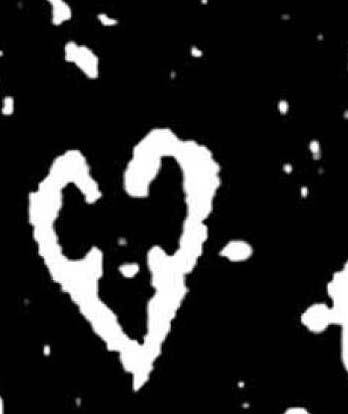
甲骨文合集6,殷
貞王心不。
按: 象心臟之形。
甲骨文合集905,殷
勿帝于心。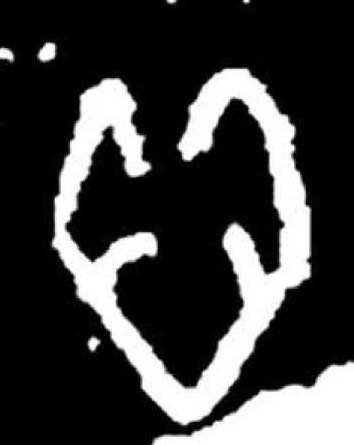
甲骨文合集14022,殷
貞涉心狩。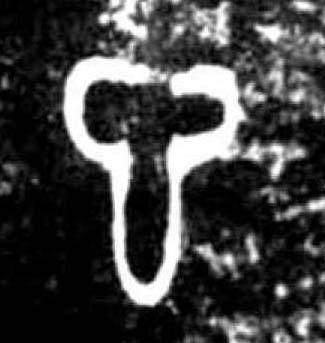
𤼈鐘, 殷周金文集成247, 西周中期
克朙(明)氒心疋(胥)尹。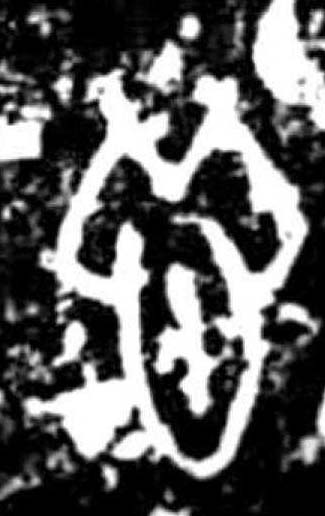
師![]() 鼎,殷周金文集成2830,西周中期
鼎,殷周金文集成2830,西周中期
乃用心引正乃辟安德。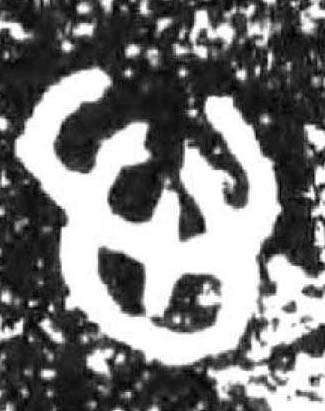
散氏盤,殷周金文集成10176,西周晚期
實余有![]() (散)氏心賊。
(散)氏心賊。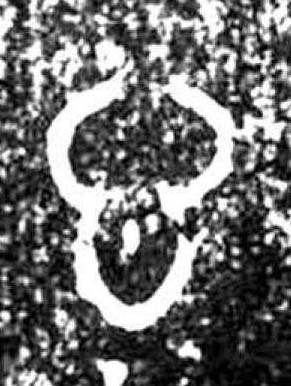
上曾大子鼎,殷周金文集成2750,春秋早期
心![]() 若
若![]() (慮)哀哀利
(慮)哀哀利![]() (錐)。
(錐)。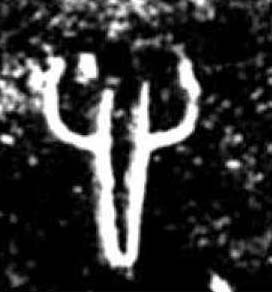
秦公鎛,殷周金文集成268,春秋早期
克朙(明)又(有)心。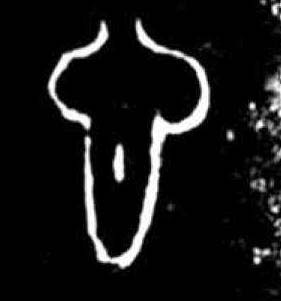
𦅫鎛, 殷周金文集成271, 春秋中期或晚期
余彌心畏誋(忌)。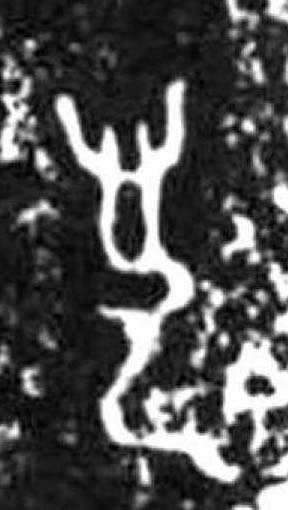
蔡侯紐鐘,殷周金文集成210,春秋晚期
既悤于心。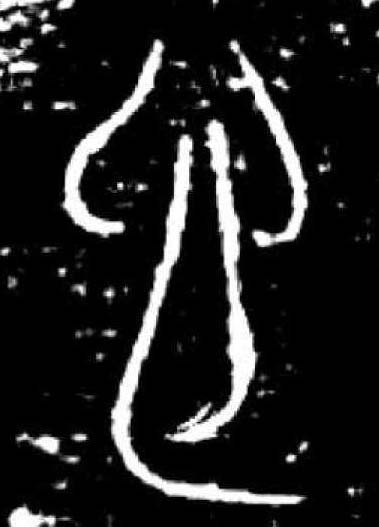
王孫遺者鐘,殷周金文集成261,春秋晚期
余恁![]() 心。
心。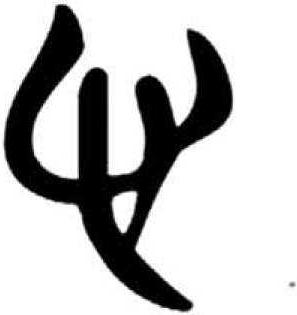
侯馬盟書195:1,春秋
大心。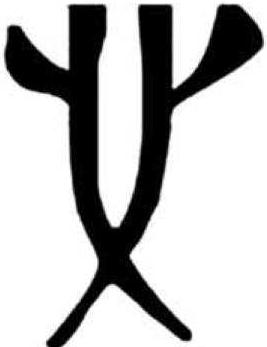
侯馬盟書1:29,春秋
大心。
侯馬盟書16:31,春秋
大心。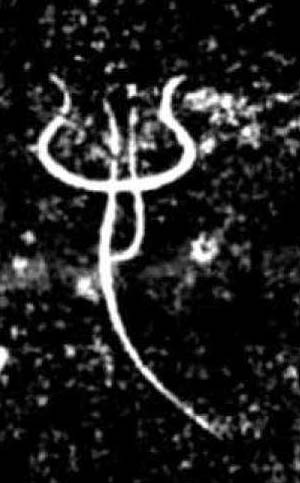
中山王![]() 方壺,殷周金文集成9735,戰國晚期
方壺,殷周金文集成9735,戰國晚期
不貳其心。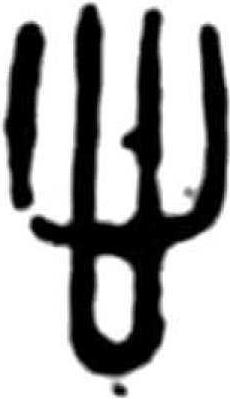
古璽彙編4499,戰國
同心。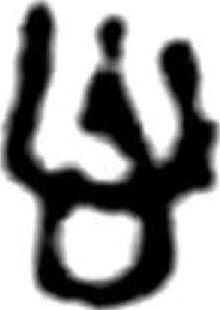
古璽彙編4501,戰國
同心。
古陶文彙編3.620,戰國
丘齊辛里邾夻心。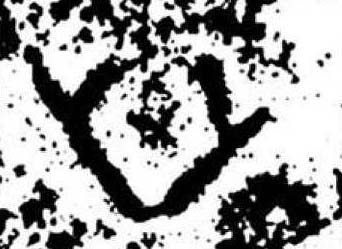
古陶文彙編3.690,戰國
□墨弛里即□![]() 心。
心。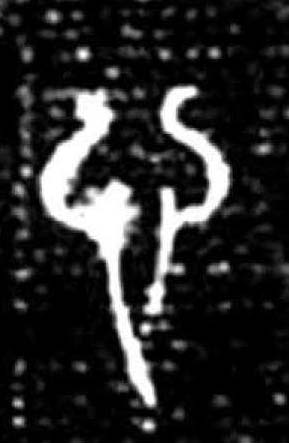
詛楚文,戰國
昔我先君穆公及楚成王繆力同心。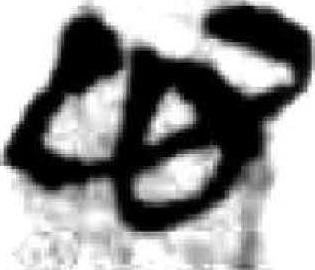
包山楚簡·卜筮祭禱記録218,戰國
以其下心而疾。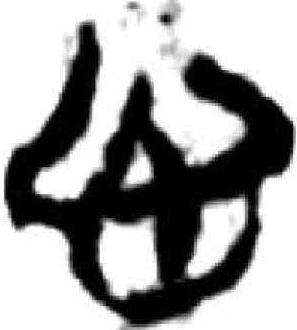
包山楚簡·卜筮祭禱記録245,戰國
既腹心疾, ![]() (以)
(以)![]() 𢟪(氣), 不甘飤(食), 尚
𢟪(氣), 不甘飤(食), 尚![]() (速)
(速)![]() (疽〔瘥〕),毋又(有)柰。
(疽〔瘥〕),毋又(有)柰。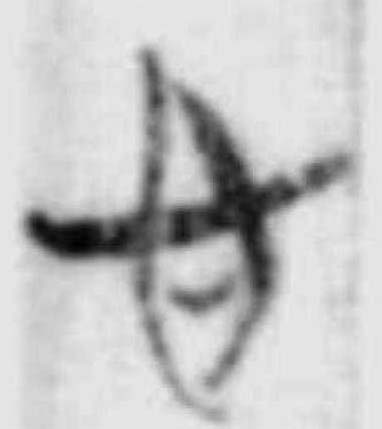
郭店楚墓竹簡·緇衣8,戰國
民以君爲心。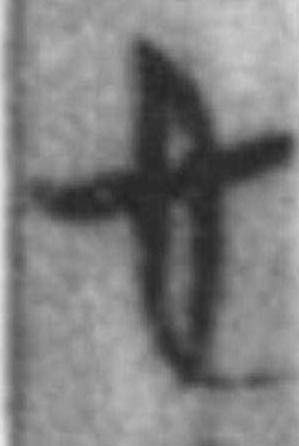
郭店楚墓竹簡·緇衣24,戰國
則民又(有)![]() (㝃〔慢〕)心。
(㝃〔慢〕)心。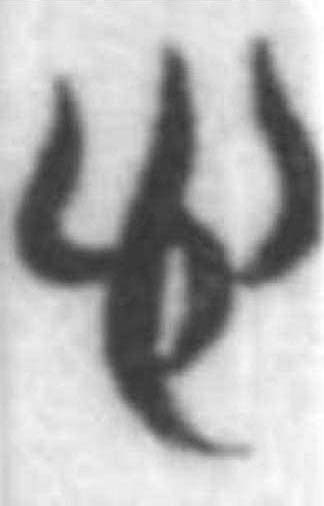
郭店楚墓竹簡·五行10,戰國
我心則……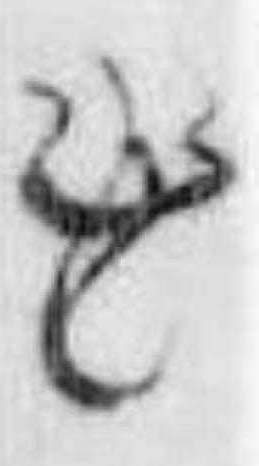
郭店楚墓竹簡·性自命出26,戰國
羕(詠)思而![]() (動)心。
(動)心。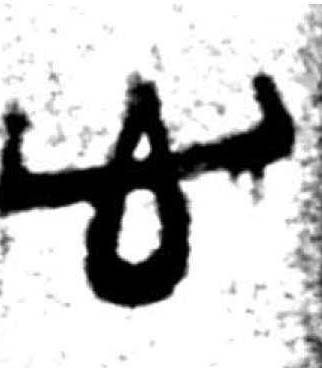
上海博物館藏戰國楚竹書一·孔子詩論4,戰國
丌(其)甬(用)心也𨟻(將)可(何)女(如)?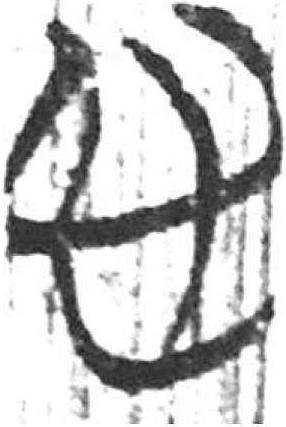
上海博物館藏戰國楚竹書四·逸詩—交交鳴![]() 3, 戰國
3, 戰國
隹(唯)心是藇。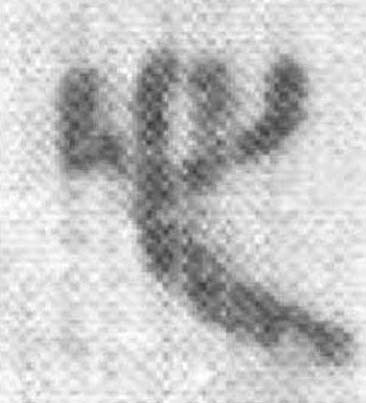
睡虎地秦墓竹簡·語書9,戰國至秦
故有公心。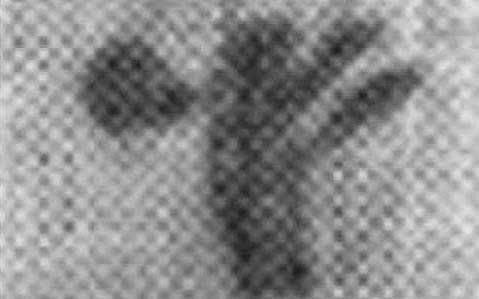
睡虎地秦墓竹簡·日書甲種36背,戰國至秦
以棘椎桃秉(柄)以![]() (敲)其心。
(敲)其心。
睡虎地秦墓竹簡·日書甲種56正,戰國至秦
心尾少(小)吉。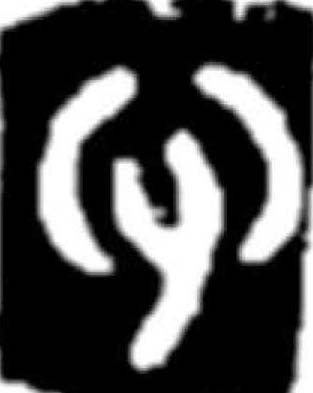
秦印文字彙編
真心。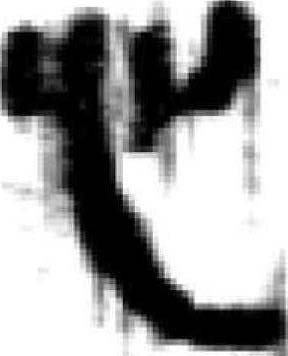
銀雀山漢墓竹簡·尉繚子503,西漢
毋(無)戰心。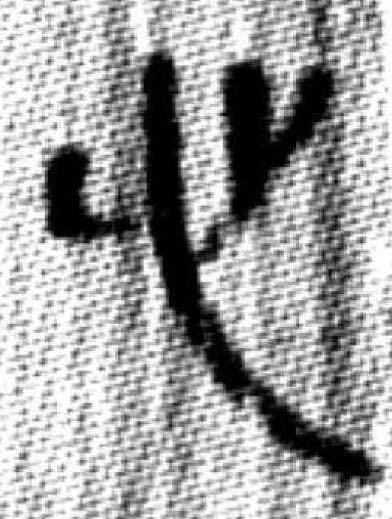
張家山漢簡·脈書24,西漢
心惕然欲獨閉户牖而處。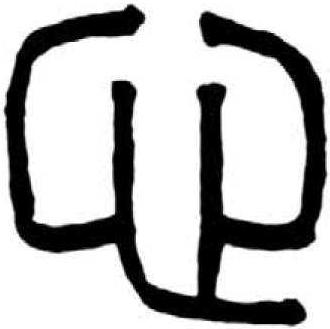
漢印文字徵
同心國丞。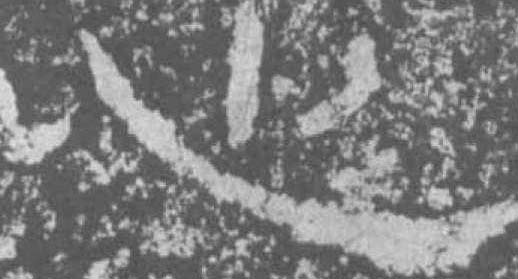
石門頌,東漢
履尾心寒。
元演墓誌,北魏
淵霞雖遠,藏之於寸心。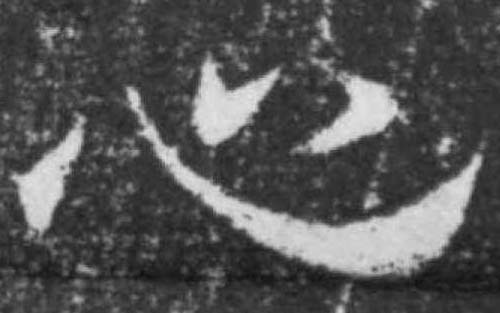
竇泰墓誌,北齊
四海痛心,三靈憤惋。
雲門寺法懃塔銘,北齊
翻(飜)翥入道之心。
田光山妻李氏墓誌,隋
一志居心。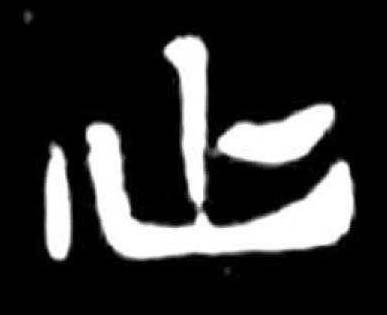
皇甫深墓誌,隋
心澄水鏡。
楊承福墓誌,唐
迺心以慎。
房光庭墓誌,唐
但自恭剋貞心。
《説文》:“心,人心,土藏,在身之中。象形。博士説以爲火藏。凡心之屬皆从心。”
心xīn
西周金文象心脏形。战国即略不象,主要由于中间一笔拖长。小篆和汉初篆隶过渡的字形继承。东汉隶书已把三弧笔缩短,变作横列三点。其后隶楷继承,作心。心即指心脏,是人和高等动物体内主管血液循环的器官。组词如:心腹|心胸。近代以前以心为思维器官,还指思想情况、感情等。如:心思|心得|用心|心情|开心|伤心|谈心|全心全意。组词如:心理|小心。引申指事物的中央,在中央的地位或部分。如:掌心|江心|圆心。组词如:中心。又在星名上,假借为二十八宿(xiù)之一。也叫“商”。
心★常◎常

xīn象形,甲骨文、金文象心脏形,小篆字形稍变,隶定为“心”。本义为心脏,人和高等动物身体内推动血液循环的器官,引申为思维的器官(古人这样认为,相当于“脑”)、思想或感情、心脏所在的胸部、中央的部位、重要的部分等。
【辨析】
❶“心”作左偏旁时一般写作“忄”。
❷以“心”作意符构成的形声字多与心有关,大致可分为三类:a.与心有关的事物,如“意、志、性、情、态、恩、惠”;b.与心有关的性状,如“忠、恭、慈、慎、愚、恶、懦、怠、惰、懈、懒、慷慨、惆怅、憔悴”;c.与心有关的动作,如“思、想、念、怀、忘、悔、恨、忧、愁、愧、憎、怒、怜、悦、慰、悲、惧”。
❸以“心”作音符构成的形声字一般韵母为in,但声调和声母不同。xīn:芯∣qìn:沁、吣。
心 (xīn)
(xīn)
中象心形,外兼象心包絡也。
心.jpg) 甲
甲.jpg) 金
金.jpg) 篆
篆.jpg) 隶xīn
隶xīn
【析形】象形字。古文字形像心脏之形。隶书字形变后象形整体解散。
【释义】《说文》:“人心。”本义是指心脏。古人认为心是思维的器官,故引申泛指思想、心意、内心、性情、思谋,如[心计]指计谋,心里的盘算。也引申指心所在的胸部,如心口、心窝儿等。心在人身之中,故又引申指事物的中心、中央,如手心、圆心。[一见倾心]一见面就产生倾慕的情感。[人心不古]谓世人的心地没有古人厚道,多用以感叹世风日薄。
【shape analysis】It is the pictograph character.It looks like a heart.
【original meaning】Heart.
*心sjiəm
[甲骨]( )
)
[金文]
[小篆] 《說文》:  ,人心土藏也。在身之中。象形。博士說以為火藏。凡心之屬皆从心。(十篇下)
,人心土藏也。在身之中。象形。博士說以為火藏。凡心之屬皆从心。(十篇下)
象心臟之形。
- 姚景远是什么意思
- 姚曦是什么意思
- 姚曾谟是什么意思
- 姚最是什么意思
- 姚月华是什么意思
- 姚有多是什么意思
- 姚望深是什么意思
- 姚期是什么意思
- 姚木兰是什么意思
- 姚木榜是什么意思
- 姚本是什么意思
- 姚李是什么意思
- 姚李遗址是什么意思
- 姚束之是什么意思
- 姚杰是什么意思
- 姚松田是什么意思
- 姚松龄是什么意思
- 姚枢是什么意思
- 姚柬之是什么意思
- 姚柬之威德并施是什么意思
- 姚柬之庙中设计擒奸贼是什么意思
- 姚树基是什么意思
- 姚树荫是什么意思
- 姚栖霞是什么意思
- 姚根子货是什么意思
- 姚桂新是什么意思
- 姚桂根是什么意思
- 姚桐斌是什么意思
- 姚桐豫是什么意思
- 姚桢是什么意思
- 姚梅伯是什么意思
- 姚梅凤是什么意思
- 姚梅镇是什么意思
- 姚梦熊是什么意思
- 姚梦穀是什么意思
- 姚梦谷是什么意思
- 姚森是什么意思
- 姚棻是什么意思
- 姚椿是什么意思
- 姚楗是什么意思
- 姚楚克是什么意思
- 姚楠是什么意思
- 姚槐是什么意思
- 姚樞是什么意思
- 姚樹基是什么意思
- 姚檀栋是什么意思
- 姚次会是什么意思
- 姚欣则是什么意思
- 姚正中是什么意思
- 姚武功是什么意思
- 姚毅全是什么意思
- 姚氏是什么意思
- 姚氏妇杨氏的人物故事|评价|小传,姚氏妇杨氏的事迹|史鉴是什么意思
- 姚氏的人物故事|评价|小传,姚氏的事迹|史鉴是什么意思
- 姚民哀是什么意思
- 姚水复是什么意思
- 姚水娟是什么意思
- 姚永朴是什么意思
- 姚永根是什么意思
- 姚永概是什么意思